#Ramadan has an effect throughout the life of a believer
Text

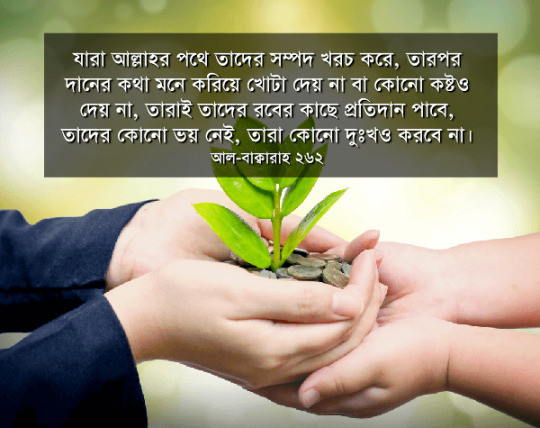

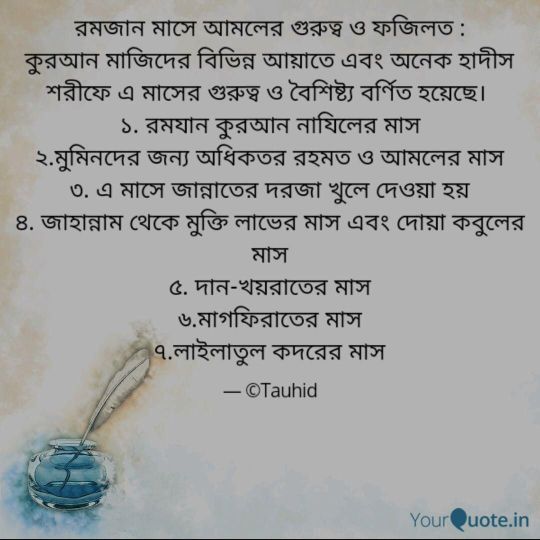


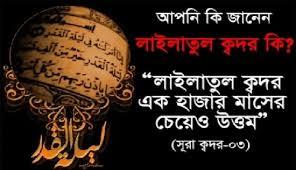
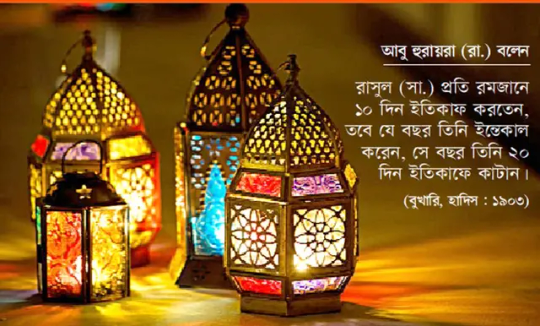






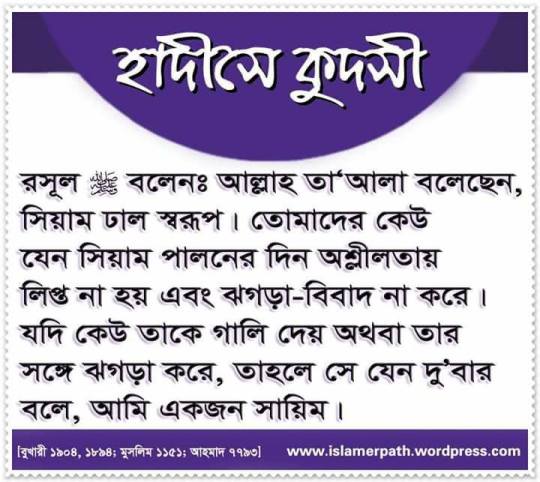
রমজানের প্রভাব মুমিনের জীবনজুড়ে থাকে
The effect of Ramadan lasts throughout the life of a believer
রমজানের প্রভাব মুমিনের জীবনজুড়ে থাকে
‘শবে কদর’ রমজানের অনন্য উপহার। এ মাসে রয়েছে শবে কদর বা এমন একটি রাত, যা হাজার মাস অপেক্ষা উত্তম। যা লাইলাতুল কদর বা শবে কদর নামে পরিচিত। হাজার মাস মানে সোয়া তিরাশি বছর। অর্থাৎ একটি মানবজীবনের ব্যাপ্তিকালের সমান। সুতরাং রমজানের সুফল জীবনব্যাপী।
‘ইমান’ হলো ইসলামের পঞ্চস্তম্ভের প্রথম স্তম্ভ। ইমান বা বিশ্বাস ইসলামের প্রাণশক্তি। ইমান মানবজীবনে মূল চালিকা শক্তি। রমজানের সঙ্গে ইমানের সুদৃঢ় যোগসূত্র বিদ্যমান।
ইমানের ভিত্তি হলো ওহি। ওহি তথা আসমানি কিতাবগুলো অবতীর্ণ হয়েছে রমজান মাসে। কোরআন মাজিদও রমজান মাসে শবে কদরে অবতীর্ণ হয়েছে।
ইমান যেমন মানুষকে কুফর ও শিরক থেকে মুক্ত করে, তেমনি রমজান মানুষকে পাপ-পঙ্কিলতা থেকে পবিত্র করে।
‘সলাত’ বা নামাজ ইসলামের পঞ্চস্তম্ভের দ্বিতীয় স্তম্ভ—ইমানের পরেই হলো নামাজ। রমজান মাস হলো নামাজের মাস। যেমন তারাবিহ বা প্রশান্তির বিশ্রামের নামাজ ও কিয়ামুল্লাইল বা রাত জাগরণের নামাজের পাশাপাশি রমজানে সাহ্রির বদৌলতে তাহাজ্জুদ নামাজ পড়া সহজ হয়; এশার নামাজ ও ফজরের নামাজ জামাতে পড়ার সুযোগ বৃদ্ধি হয়, যাতে সম্পূর্ণ রাত্রি জাগরণের সওয়াব পাওয়া যায়।
এই মাসে নফল নামাজ পড়ার সুযোগও বেশি পাওয়া যায়।
‘জাকাত’ ইসলামের পঞ্চস্তম্ভের তৃতীয় স্তম্ভ। সাহাবায়ে কিরাম রমজানেই জাকাত প্রদান করতেন। চান্দ্রবর্ষের হিসাব ও তারিখ অনুযায়ী সঠিকভাবে জাকাত দেওয়া রমজান মাসে সহজ হয়। এতে গরিবদেরও সুবিধা হয়।
‘হজ’ ইসলামের পঞ্চস্তম্ভের চতুর্থ স্তম্ভ। রমজানে ওমরাহ পালন করলে নবীজি (সা.)–এর সঙ্গে হজ করার সওয়াব পাওয়া যায়।
‘সওম’ বা রোজা হলো ইসলামের পঞ্চস্তম্ভের পঞ্চম স্তম্ভ। সিয়াম বা রোজা হলো রমজানের সেরা অনুষঙ্গ। আগুন যেমন সোনাকে জ্বালিয়ে খাদমুক্ত করে দেয়, রোজা তেমন ইমানদারের ষড়্রিপুর কামনা–বাসনাকে জ্বালিয়ে পুড়িয়ে রোজাদারকে খাঁটি বান্দায় পরিণত করে। তাই মহান আল্লাহ রব্বুল আলামিন রোজার জন্য রমজান মাসকেই নির্ধারণ করেছেন।
‘শবে কদর’ রমজানের অনন্য উপহার। এ মাসে রয়েছে শবে কদর বা এমন একটি রাত, যা হাজার মাস অপেক্ষা উত্তম। যা লাইলাতুল কদর বা শবে কদর নামে পরিচিত। হাজার মাস মানে সোয়া তিরাশি বছর। অর্থাৎ একটি মানবজীবনের ব্যাপ্তিকালের সমান। সুতরাং রমজানের সুফল জীবনব্যাপী।
রোজার ফিদইয়া’ রমজানের একটি শ্রেষ্ঠ মাহাত্ম্য। রোজা একটি শারীরিক ও মানসিক ইবাদত। কিন্তু অক্ষম ও দুর্বল ব্যক্তির জন্য এর কাজার পাশাপাশি অপারগতায় ফিদইয়ার ব্যবস্থা রাখা হয়েছে; যা আর্থিক ইবাদত। এতে রোজার পরিধির ব্যাপকতা বোঝা যায়।
রোজা শারীরিক ইবাদত হওয়া সত্ত্বেও দুর্বল ব্যক্তি যদি রোজা ভঙ্গ করেন; তার জন্য আল্লাহ তাআলা কাফফারা বিধান দিয়েছেন। যার মাধ্যমগুলো হলো দাসমুক্ত করা বা ৬০ জন গরিবকে দুই বেলা তৃপ্তিসহকারে খাওয়ানো অথবা একাধারে ৬০টি রোজা রাখা। যিনি ৩০ দিবসের মধ্যেই রোজা ভাঙেন, তিনি ৬০ দিবস কীভাবে তা পালন করবেন? মানে আবারও ভাঙলে আবারও ভাঙার জন্য দাস মুক্তি বা ৬০ জন মিসকিন খাওয়ানো। মানে হলো দানখয়রাত–সদাকাত তথা গরিবের সেবা ও সমাজের কল্যাণই রমজানের মুখ্য উদ্দেশ্য।
‘সদকাতুল ফিতর’ রোজার সেরা সৌন্দর্য। রোজা শেষে ঈদুল ফিতরের দিন সকালবেলা ঈদের নামাজে যাওয়ার আগে সদকাতুল ফিতর আদায় করতে হয়। দাতা ও গ্রহীতার সুবিধার্থে রমজানেও প্রদান করা যায়। এই ঈদের সঙ্গে ফিতরার সম্পৃক্ততার কারণে এর নাম ঈদুল ফিতর। সদকাতুল ফিতর বা ‘ফিতরা’ হলো ঈদের আনন্দকে সর্বজনীন করার উপায়। ধনী–গরিব সবাই যেন ঈদের আনন্দে শামিল হতে পারেন, তাই এ ব্যবস্থা। মানুষ সামাজিক জীব, মানুষ অন্যের আনন্দ ও বেদনায় প্রভাবিত হয়। তাই এ আনন্দের দিনে পাড়া–প্রতিব���শী ও আত্মীয়স্বজন যদি আনন্দে শামিল হতে না পারে, তবে আনন্দ পূর্ণতা পাবে না। তাই নিজের আনন্দ সবার মধ্যে বিলিয়ে দিতে ও ছড়িয়ে দিতে এ ব্যবস্থা। ফিতরা বা সদকাতুল ফিতর হলো রমজানে রোজা পালনের শুকরিয়া স্বরূপ। এটি রোজার অপূর্ণতাকে পূর্ণতা দেয়।
‘ইতিকাফ’ রমজানের বিশেষ তুহফা। আল্লাহর সান্নিধ্য মানবজীবনে আরাধ্য। এর অন্যতম মাধ্যম হলো ইতিকাফ।
‘শবে কদর’ রমজানের অনন্য উপহার। এ মাসে রয়েছে শবে কদর বা এমন একটি রাত, যা হাজার মাস অপেক্ষা উত্তম। যা লাইলাতুল কদর বা শবে কদর নামে পরিচিত। হাজার মাস মানে সোয়া তিরাশি বছর। অর্থাৎ একটি মানবজীবনের ব্যাপ্তিকালের সমান। সুতরাং রমজানের সুফল জীবনব্যাপী।
মুসলমানের জীবনে রমজানের প্রভাব
youtube
রমজান: রোজা যখন রাখেন, তখন আপনার শরীরে কী ঘটে?
youtube
কিশোর ও যুবকদের নৈতিক জীবন গঠনে রমজানের ভূমিকা
youtube
রমজানের প্রভাব মুমিনের জীবনজুড়ে থাকে
The effect of Ramadan lasts throughout the life of a believer
Ramadan has an effect throughout the life of a believer
#রমজানের প্রভাব মুমিনের জীবনজুড়ে থাকে#The effect of Ramadan lasts throughout the life of a believer#Ramadan has an effect throughout the life of a believer#Shabakdar#'Itikaaf#Zakat#Salat#Namaz#SadakatulFitr#RamadanEffects#MuminerLife#LailatulKadar#Soam#Roja#SiamBa#Ibadat#FivepillarsofIslam#Ramadanmonth#Tarabeeh#Qiyamullail#Nightwake#Ramadan#Sahri#DanKhayrat–#Sadaqa#Fitrah#Iftar#শবেকদর#‘ইতিকাফ#জাকাত
0 notes
Text
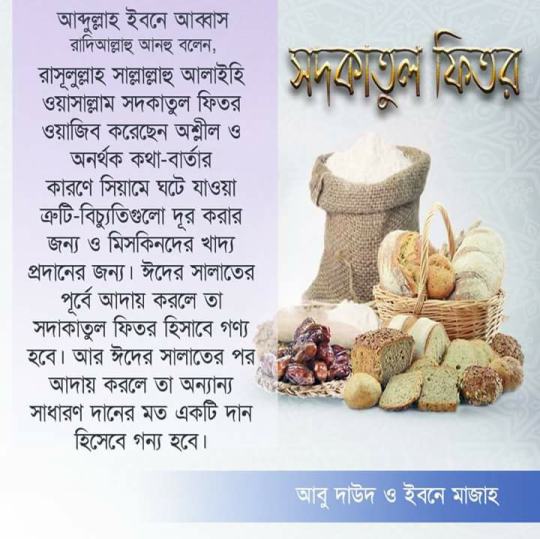
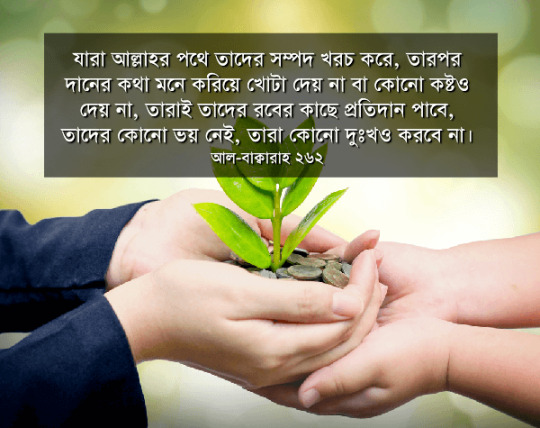

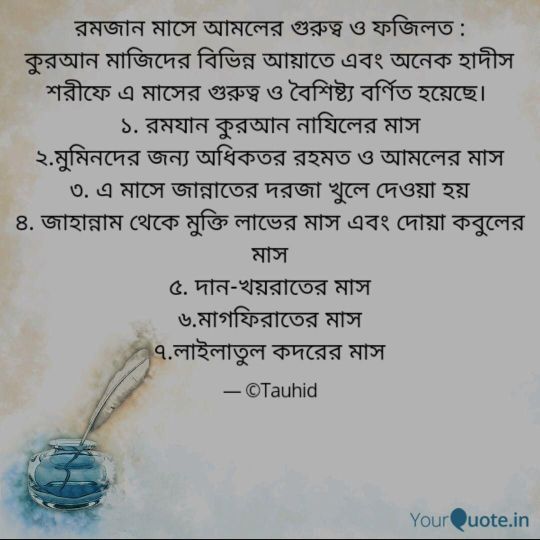

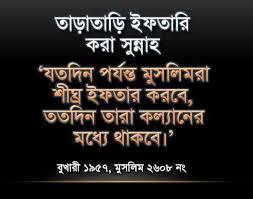
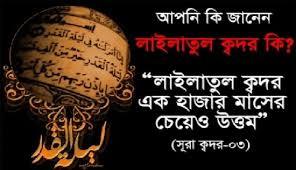
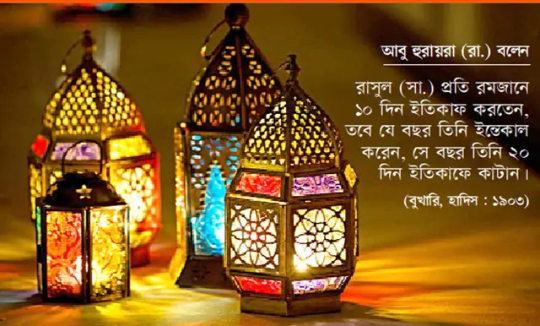
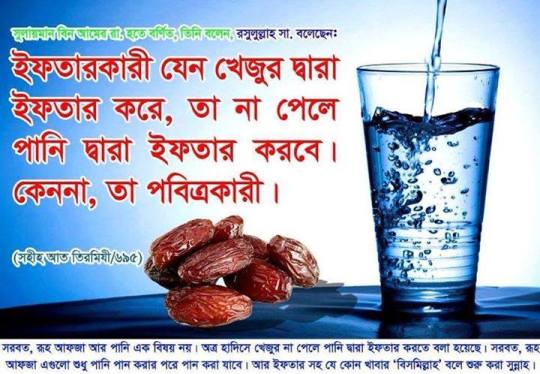
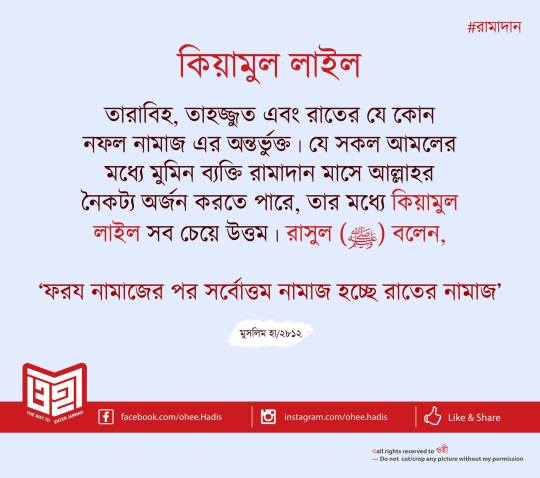

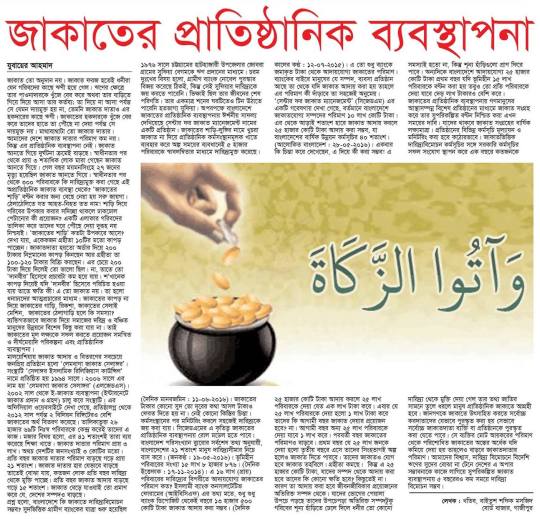

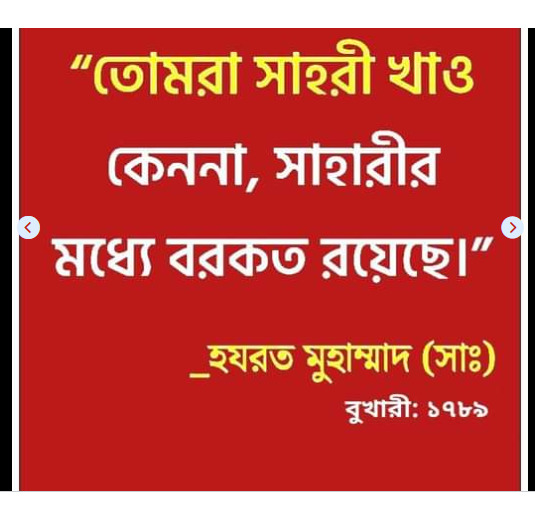

রমজানের প্রভাব মুমিনের জীবনজুড়ে থাকে
The effect of Ramadan lasts throughout the life of a believer
রমজানের প্রভাব মুমিনের জীবনজুড়ে থাকে
‘শবে কদর’ রমজানের অনন্য উপহার। এ মাসে রয়েছে শবে কদর বা এমন একটি রাত, যা হাজার মাস অপেক্ষা উত্তম। যা লাইলাতুল কদর বা শবে কদর নামে পরিচিত। হাজার মাস মানে সোয়া তিরাশি বছর। অর্থাৎ একটি মানবজীবনের ব্যাপ্তিকালের সমান। সুতরাং রমজানের সুফল জীবনব্যাপী।
‘ইমান’ হলো ইসলামের পঞ্চস্তম্ভের প্রথম স্তম্ভ। ইমান বা বিশ্বাস ইসলামের প্রাণশক্তি। ইমান মানবজীবনে মূল চালিকা শক্তি। রমজানের সঙ্গে ইমানের সুদৃঢ় যোগসূত্র বিদ্যমান।
ইমানের ভিত্তি হলো ওহি। ওহি তথা আসমানি কিতাবগুলো অবতীর্ণ হয়েছে রমজান মাসে। কোরআন মাজিদও রমজান মাসে শবে কদরে অবতীর্ণ হয়েছে।
ইমান যেমন মানুষকে কুফর ও শিরক থেকে মুক্ত করে, তেমনি রমজান মানুষকে পাপ-পঙ্কিলতা থেকে পবিত্র করে।
‘সলাত’ বা নামাজ ইসলামের পঞ্চস্তম্ভের দ্বিতীয় স্তম্ভ—ইমানের পরেই হলো নামাজ। রমজান মাস হলো নামাজের মাস। যেমন তারাবিহ বা প্রশান্তির বিশ্রামের নামাজ ও কিয়ামুল্লাইল বা রাত জাগরণের নামাজের পাশাপাশি রমজানে সাহ্রির বদৌলতে তাহাজ্জুদ নামাজ পড়া সহজ হয়; এশার নামাজ ও ফজরের নামাজ জামাতে পড়ার সুযোগ বৃদ্ধি হয়, যাতে সম্পূর্ণ রাত্রি জাগরণের সওয়াব পাওয়া যায়।
এই মাসে নফল নামাজ পড়ার সুযোগও বেশি পাওয়া যায়।
‘জাকাত’ ইসলামের পঞ্চস্তম্ভের তৃতীয় স্তম্ভ। সাহাবায়ে কিরাম রমজানেই জাকাত প্রদান করতেন। চান্দ্রবর্ষের হিসাব ও তারিখ অনুযায়ী সঠিকভাবে জাকাত দেওয়া রমজান মাসে সহজ হয়। এতে গরিবদেরও সুবিধা হয়।
‘হজ’ ইসলামের পঞ্চস্তম্ভের চতুর্থ স্তম্ভ। রমজানে ওমরাহ পালন করলে নবীজি (সা.)–এর সঙ্গে হজ করার সওয়াব পাওয়া যায়।
‘সওম’ বা রোজা হলো ইসলামের পঞ্চস্তম্ভের পঞ্চম স্তম্ভ। সিয়াম বা রোজা হলো রমজানের সেরা অনুষঙ্গ। আগুন যেমন সোনাকে জ্বালিয়ে খাদমুক্ত করে দেয়, রোজা তেমন ইমানদারের ষড়্রিপুর কামনা–বাসনাকে জ্বালিয়ে পুড়িয়ে রোজাদারকে খাঁটি বান্দায় পরিণত করে। তাই মহান আল্লাহ রব্বুল আলামিন রোজার জন্য রমজান মাসকেই নির্ধারণ করেছেন।
‘শবে কদর’ রমজানের অনন্য উপহার। এ মাসে রয়েছে শবে কদর বা এমন একটি রাত, যা হাজার মাস অপেক্ষা উত্তম। যা লাইলাতুল কদর বা শবে কদর নামে পরিচিত। হাজার মাস মানে সোয়া তিরাশি বছর। অর্থাৎ একটি মানবজীবনের ব্যাপ্তিকালের সমান। সুতরাং রমজানের সুফল জীবনব্যাপী।
রোজার ফিদইয়া’ রমজানের একটি শ্রেষ্ঠ মাহাত্ম্য। রোজা একটি শারীরিক ও মানসিক ইবাদত। কিন্তু অক্ষম ও দুর্বল ব্যক্তির জন্য এর কাজার পাশাপাশি অপারগতায় ফিদইয়ার ব্যবস্থা রাখা হয়েছে; যা আর্থিক ইবাদত। এতে রোজার পরিধির ব্যাপকতা বোঝা যায়।
রোজা শারীরিক ইবাদত হওয়া সত্ত্বেও দুর্বল ব্যক্তি যদি রোজা ভঙ্গ করেন; তার জন্য আল্লাহ তাআলা কাফফারা বিধান দিয়েছেন। যার মাধ্যমগুলো হলো দাসমুক্ত করা বা ৬০ জন গরিবকে দুই বেলা তৃপ্তিসহকারে খাওয়ানো অথবা একাধারে ৬০টি রোজা রাখা। যিনি ৩০ দিবসের মধ্যেই রোজা ভাঙেন, তিনি ৬০ দিবস কীভাবে তা পালন করবেন? মানে আবারও ভাঙলে আবারও ভাঙার জন্য দাস মুক্তি বা ৬০ জন মিসকিন খাওয়ানো। মানে হলো দানখয়রাত–সদাকাত তথা গরিবের সেবা ও সমাজের কল্যাণই রমজানের মুখ্য উদ্দেশ্য।
‘সদকাতুল ফিতর’ রোজার সেরা সৌন্দর্য। রোজা শেষে ঈদুল ফিতরের দিন সকালবেলা ঈদের নামাজে যাওয়ার আগে সদকাতুল ফিতর আদায় করতে হয়। দাতা ও গ্রহীতার সুবিধার্থে রমজানেও প্রদান করা যায়। এই ঈদের সঙ্গে ফিতরার সম্পৃক্ততার কারণে এর নাম ঈদুল ফিতর। সদকাতুল ফিতর বা ‘ফিতরা’ হলো ঈদের আনন্দকে সর্বজনীন করার উপায়। ধনী–গরিব সবাই যেন ঈদের আনন্দে শামিল হতে পারেন, তাই এ ব্যবস্থা। মানুষ সামাজিক জীব, মানুষ অন্যের আনন্দ ও বেদনায় প্রভাবিত হয়। তাই এ আনন্দের দিনে পাড়া–প্রতিবেশী ও আত্মীয়স্বজন যদি আনন্দে শামিল হতে না পারে, তবে আনন্দ পূর্ণতা পাবে না। তাই নিজের আনন্দ সবার মধ্যে বিলিয়ে দিতে ও ছড়িয়ে দিতে এ ব্যবস্থা। ফিতরা বা সদকাতুল ফিতর হলো রমজানে রোজা পালনের শুকরিয়া স্বরূপ। এটি রোজার অপূর্ণতাকে পূর্ণতা দেয়।
‘ইতিকাফ’ রমজানের বিশেষ তুহফা। আল্লাহর সান্নিধ্য মানবজীবনে আরাধ্য। এর অন্যতম মাধ্যম হলো ইতিকাফ।
‘শবে কদর’ রমজানের অনন্য উপহার। এ মাসে রয়েছে শবে কদর বা এমন একটি রাত, যা হাজার মাস অপেক্ষা উত্তম। যা লাইলাতুল কদর বা শবে কদর নামে পরিচিত। হাজার মাস মানে সোয়া তিরাশি বছর। অর্থাৎ একটি মানবজীবনের ব্যাপ্তিকালের সমান। সুতরাং রমজানের সুফল জীবনব্যাপী।
মুসলমানের জীবনে রমজানের প্রভাব
youtube
রমজান: রোজা যখন রাখেন, তখন আপনার শরীরে কী ঘটে?
youtube
কিশোর ও যুবকদের নৈতিক জীবন গঠনে রমজানের ভূমিকা
youtube
রমজানের প্রভাব মুমিনের জীবনজুড়ে থাকে
The effect of Ramadan lasts throughout the life of a believer
Ramadan has an effect throughout the life of a believer
The effect of Ramadan lasts throughout the life of a believer
#রমজানের প্রভাব মুমিনের জীবনজুড়ে থাকে#The effect of Ramadan lasts throughout the life of a believer#Ramadan has an effect throughout the life of a believer#Shabakdar#'Itikaaf#Zakat#Salat#Namaz#SadakatulFitr#RamadanEffects#MuminerLife#LailatulKadar#Soam#Roja#SiamBa#Ibadat#FivepillarsofIslam#Ramadanmonth#Tarabeeh#Qiyamullail#Nightwake#Ramadan#Sahri#DanKhayrat–#Sadaqa#Fitrah#Iftar#শবেকদর#‘ইতিকাফ#জাকাত
0 notes
Text
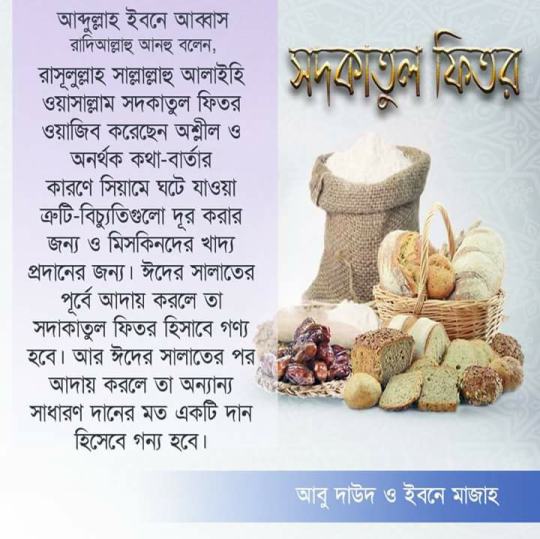

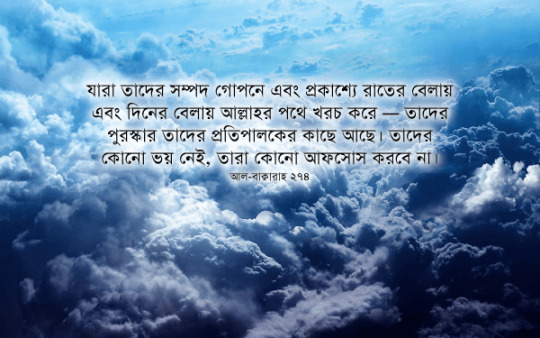




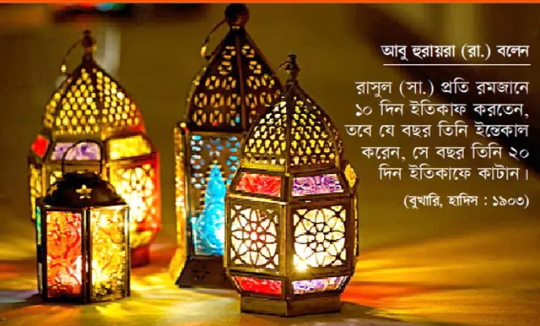

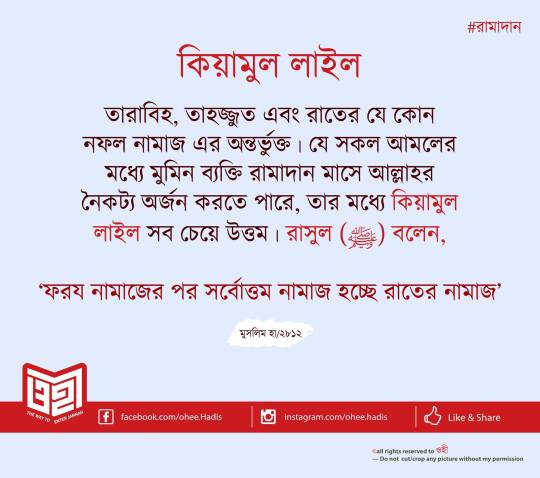

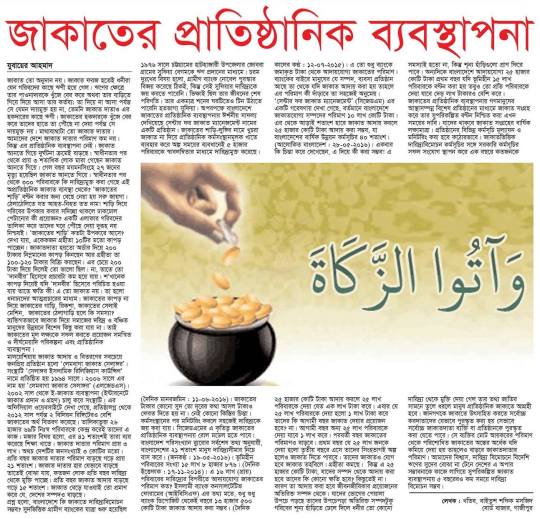
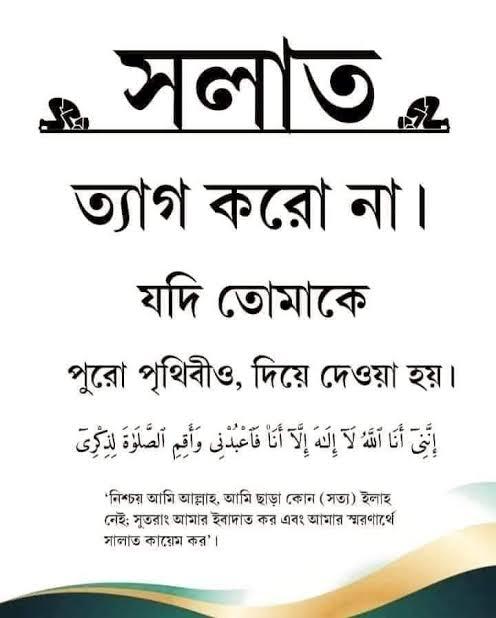
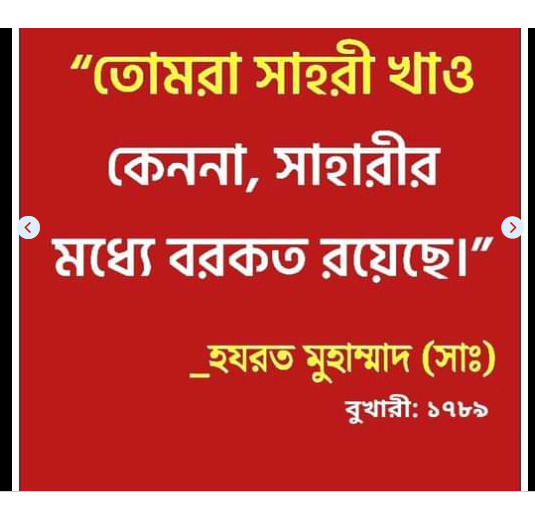
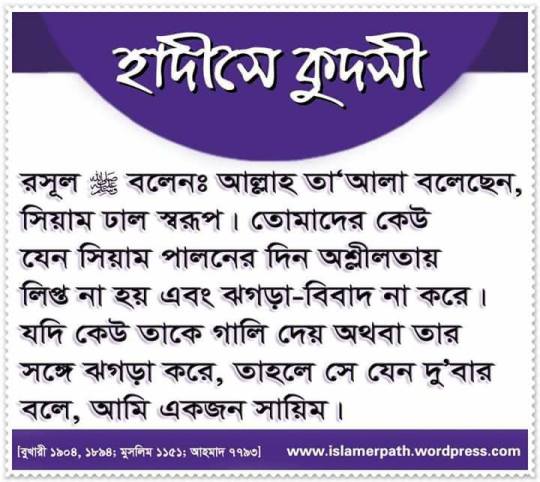
রমজানের প্রভাব মুমিনের জীবনজুড়ে থাকে
The effect of Ramadan lasts throughout the life of a believer
রমজানের প্রভাব মুমিনের জীবনজুড়ে থাকে
‘শবে কদর’ রমজানের অনন্য উপহার। এ মাসে রয়েছে শবে কদর বা এমন একটি রাত, যা হাজার মাস অপেক্ষা উত্তম। যা লাইলাতুল কদর বা শবে কদর নামে পরিচিত। হাজার মাস মানে সোয়া তিরাশি বছর। অর্থাৎ একটি মানবজীবনের ব্যাপ্তিকালের সমান। সুতরাং রমজানের সুফল জীবনব্যাপী।
‘ইমান’ হলো ইসলামের পঞ্চস্তম্ভের প্রথম স্তম্ভ। ইমান বা বিশ্বাস ইসলামের প্রাণশক্তি। ইমান মানবজীবনে মূল চালিকা শক্তি। রমজানের সঙ্গে ইমানের সুদৃঢ় যোগসূত্র বিদ্যমান।
ইমানের ভিত্তি হলো ওহি। ওহি তথা আসমানি কিতাবগুলো অবতীর্ণ হয়েছে রমজান মাসে। কোরআন মাজিদও রমজান মাসে শবে কদরে অবতীর্ণ হয়েছে।
ইমান যেমন মানুষকে কুফর ও শিরক থেকে মুক্ত করে, তেমনি রমজান মানুষকে পাপ-পঙ্কিলতা থেকে পবিত্র করে।
‘সলাত’ বা নামাজ ইসলামের পঞ্চস্তম্ভের দ্বিতীয় স্তম্ভ—ইমানের পরেই হলো নামাজ। রমজান মাস হলো নামাজের মাস। যেমন তারাবিহ বা প্রশান্তির বিশ্রামের নামাজ ও কিয়ামুল্লাইল বা রাত জাগরণের নামাজের পাশাপাশি রমজানে সাহ্রির বদৌলতে তাহাজ্জুদ নামাজ পড়া সহজ হয়; এশার নামাজ ও ফজরের নামাজ জামাতে পড়ার সুযোগ বৃদ্ধি হয়, যাতে সম্পূর্ণ রাত্রি জাগরণের সওয়াব পাওয়া যায়।
এই মাসে নফল নামাজ পড়ার সুযোগও বেশি পাওয়া যায়।
‘জাকাত’ ইসলামের পঞ্চস্তম্ভের তৃতীয় স্তম্ভ। সাহাবায়ে কিরাম রমজানেই জাকাত প্রদান করতেন। চান্দ্রবর্ষের হিসাব ও তারিখ অনুযায়ী সঠিকভাবে জাকাত দেওয়া রমজান মাসে সহজ হয়। এতে গরিবদেরও সুবিধা হয়।
‘হজ’ ইসলামের পঞ্চস্তম্ভের চতুর্থ স্তম্ভ। রমজানে ওমরাহ পালন করলে নবীজি (সা.)–এর সঙ্গে হজ করার সওয়াব পাওয়া যায়।
‘সওম’ বা রোজা হলো ইসলামের পঞ্চস্তম্ভের পঞ্চম স্তম্ভ। সিয়াম বা রোজা হলো রমজানের সেরা অনুষঙ্গ। আগুন যেমন সোনাকে জ্বালিয়ে খাদমুক্ত করে দেয়, রোজা তেমন ইমানদারের ষড়্রিপুর কামনা–বাসনাকে জ্বালিয়ে পুড়িয়ে রোজাদারকে খাঁটি বান্দায় পরিণত করে। তাই মহান আল্লাহ রব্বুল আলামিন রোজার জন্য রমজান মাসকেই নির্ধারণ করেছেন।
‘শবে কদর’ রমজানের অনন্য উপহার। এ মাসে রয়েছে শবে কদর বা এমন একটি রাত, যা হাজার মাস অপেক্ষা উত্তম। যা লাইলাতুল কদর বা শবে কদর নামে পরিচিত। হাজার মাস মানে সোয়া তিরাশি বছর। অর্থাৎ একটি মানবজীবনের ব্যাপ্তিকালের সমান। সুতরাং রমজানের সুফল জীবনব্যাপী।
রোজার ফিদইয়া’ রমজানের একটি শ্রেষ্ঠ মাহাত্ম্য। রোজা একটি শারীরিক ও মানসিক ইবাদত। কিন্তু অক্ষম ও দুর্বল ব্যক্তির জন্য এর কাজার পাশাপাশি অপারগতায় ফিদইয়ার ব্যবস্থা রাখা হয়েছে; যা আর্থিক ইবাদত�� এতে রোজার পরিধির ব্যাপকতা বোঝা যায়।
রোজা শারীরিক ইবাদত হওয়া সত্ত্বেও দুর্বল ব্যক্তি যদি রোজা ভঙ্গ করেন; তার জন্য আল্লাহ তাআলা কাফফারা বিধান দিয়েছেন। যার মাধ্যমগুলো হলো দাসমুক্ত করা বা ৬০ জন গরিবকে দুই বেলা তৃপ্তিসহকারে খাওয়ানো অথবা একাধারে ৬০টি রোজা রাখা। যিনি ৩০ দিবসের মধ্যেই রোজা ভাঙেন, তিনি ৬০ দিবস কীভাবে তা পালন করবেন? মানে আবারও ভাঙলে আবারও ভাঙার জন্য দাস মুক্তি বা ৬০ জন মিসকিন খাওয়ানো। মানে হলো দানখয়রাত–সদাকাত তথা গরিবের সেবা ও সমাজের কল্যাণই রমজানের মুখ্য উদ্দেশ্য।
‘সদকাতুল ফিতর’ রোজার সেরা সৌন্দর্য। রোজা শেষে ঈদুল ফিতরের দিন সকালবেলা ঈদের নামাজে যাওয়ার আগে সদকাতুল ফিতর আদায় করতে হয়। দাতা ও গ্রহীতার সুবিধার্থে রমজানেও প্রদান করা যায়। এই ঈদের সঙ্গে ফিতরার সম্পৃক্ততার কারণে এর নাম ঈদুল ফিতর। সদকাতুল ফিতর বা ‘ফিতরা’ হলো ঈদের আনন্দকে সর্বজনীন করার উপায়। ধনী–গরিব সবাই যেন ঈদের আনন্দে শামিল হতে পারেন, তাই এ ব্যবস্থা। মানুষ সামাজিক জীব, মানুষ অন্যের আনন্দ ও বেদনায় প্রভাবিত হয়। তাই এ আনন্দের দিনে পাড়া–প্রতিবেশী ও আত্মীয়স্বজন যদি আনন্দে শামিল হতে না পারে, তবে আনন্দ পূর্ণতা পাবে না। তাই নিজের আনন্দ সবার মধ্যে বিলিয়ে দিতে ও ছড়িয়ে দিতে এ ব্যবস্থা। ফিতরা বা সদকাতুল ফিতর হলো রমজানে রোজা পালনের শুকরিয়া স্বরূপ। এটি রোজার অপূর্ণতাকে পূর্ণতা দেয়।
‘ইতিকাফ’ রমজানের বিশেষ তুহফা। আল্লাহর সান্নিধ্য মানবজীবনে আরাধ্য। এর অন্যতম মাধ্যম হলো ইতিকাফ।
‘শবে কদর’ রমজানের অনন্য উপহার। এ মাসে রয়েছে শবে কদর বা এমন একটি রাত, যা হাজার মাস অপেক্ষা উত্তম। যা লাইলাতুল কদর বা শবে কদর নামে পরিচিত। হাজার মাস মানে সোয়া তিরাশি বছর। অর্থাৎ একটি মানবজীবনের ব্যাপ্তিকালের সমান। সুতরাং রমজানের সুফল জীবনব্যাপী।
মুসলমানের জীবনে রমজানের প্রভাব
youtube
রমজান: রোজা যখন রাখেন, তখন আপনার শরীরে কী ঘটে?
youtube
কিশোর ও যুবকদের নৈতিক জীবন গঠনে রমজানের ভূমিকা
youtube
রমজানের প্রভাব মুমিনের জীবনজুড়ে থাকে
The effect of Ramadan lasts throughout the life of a believer
Ramadan has an effect throughout the life of a believer
The effect of Ramadan lasts throughout the life of a believer
#রমজানের প্রভাব মুমিনের জীবনজুড়ে থাকে#The effect of Ramadan lasts throughout the life of a believer#Ramadan has an effect throughout the life of a believer#Shabakdar#'Itikaaf#Zakat#Salat#Namaz#SadakatulFitr#RamadanEffects#MuminerLife#LailatulKadar#Soam#Roja#SiamBa#Ibadat#FivepillarsofIslam#Ramadanmonth#Tarabeeh#Qiyamullail#Nightwake#Ramadan#Sahri#DanKhayrat–#Sadaqa#Fitrah#Iftar#শবেকদর#‘ইতিকাফ#জাকাত
0 notes
Text


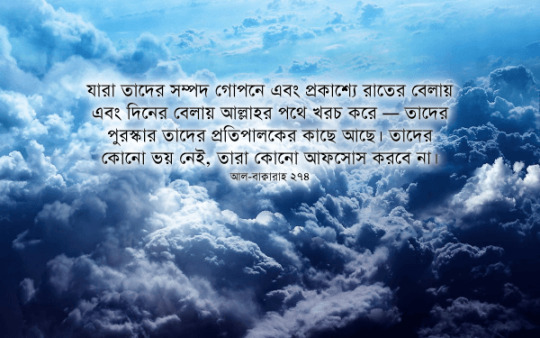




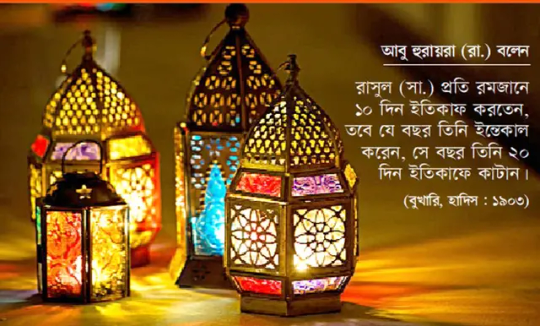
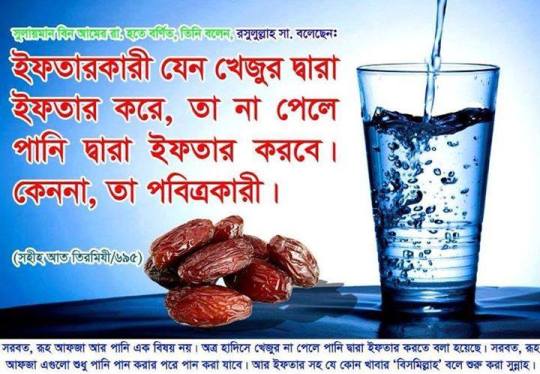


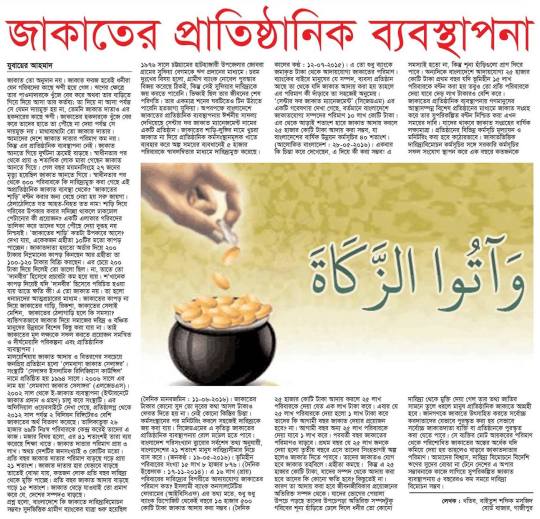



রমজানের প্রভাব মুমিনের জীবনজুড়ে থাকে
The effect of Ramadan lasts throughout the life of a believer
রমজানের প্রভাব মুমিনের জীবনজুড়ে থাকে
‘শবে কদর’ রমজানের অনন্য উপ��ার। এ মাসে রয়েছে শবে কদর বা এমন একটি রাত, যা হাজার মাস অপেক্ষা উত্তম। যা লাইলাতুল কদর বা শবে কদর নামে পরিচিত। হাজার মাস মানে সোয়া তিরাশি বছর। অর্থাৎ একটি মানবজীবনের ব্যাপ্তিকালের সমান। সুতরাং রমজানের সুফল জীবনব্যাপী।
‘ইমান’ হলো ইসলামের পঞ্চস্তম্ভের প্রথম স্তম্ভ। ইমান বা বিশ্বাস ইসলামের প্রাণশক্তি। ইমান মানবজীবনে মূল চালিকা শক্তি। রমজানের সঙ্গে ইমানের সুদৃঢ় যোগসূত্র বিদ্যমান।
ইমানের ভিত্তি হলো ওহি। ওহি তথা আসমানি কিতাবগুলো অবতীর্ণ হয়েছে রমজান মাসে। কোরআন মাজিদও রমজান মাসে শবে কদরে অবতীর্ণ হয়েছে।
ইমান যেমন মানুষকে কুফর ও শিরক থেকে মুক্ত করে, তেমনি রমজান মানুষকে পাপ-পঙ্কিলতা থেকে পবিত্র করে।
‘সলাত’ বা নামাজ ইসলামের পঞ্চস্তম্ভের দ্বিতীয় স্তম্ভ—ইমানের পরেই হলো নামাজ। রমজান মাস হলো নামাজের মাস। যেমন তারাবিহ বা প্রশান্তির বিশ্রামের নামাজ ও কিয়ামুল্লাইল বা রাত জাগরণের নামাজের পাশাপাশি রমজানে সাহ্রির বদৌলতে তাহাজ্জুদ নামাজ পড়া সহজ হয়; এশার নামাজ ও ফজরের নামাজ জামাতে পড়ার সুযোগ বৃদ্ধি হয়, যাতে সম্পূর্ণ রাত্রি জাগরণের সওয়াব পাওয়া যায়।
এই মাসে নফল নামাজ পড়ার সুযোগও বেশি পাওয়া যায়।
‘জাকাত’ ইসলামের পঞ্চস্তম্ভের তৃতীয় স্তম্ভ। সাহাবায়ে কিরাম রমজানেই জাকাত প্রদান করতেন। চান্দ্রবর্ষের হিসাব ও তারিখ অনুযায়ী সঠিকভাবে জাকাত দেওয়া রমজান মাসে সহজ হয়। এতে গরিবদেরও সুবিধা হয়।
‘হজ’ ইসলামের পঞ্চস্তম্ভের চতুর্থ স্তম্ভ। রমজানে ওমরাহ পালন করলে নবীজি (সা.)–এর সঙ্গে হজ করার সওয়াব পাওয়া যায়।
‘সওম’ বা রোজা হলো ইসলামের পঞ্চস্তম্ভের পঞ্চম স্তম্ভ। সিয়াম বা রোজা হলো রমজানের সেরা অনুষঙ্গ। আগুন যেমন সোনাকে জ্বালিয়ে খাদমুক্ত করে দেয়, রোজা তেমন ইমানদারের ষড়্রিপুর কামনা–বাসনাকে জ্বালিয়ে পুড়িয়ে রোজাদারকে খাঁটি বান্দায় পরিণত করে। তাই মহান আল্লাহ রব্বুল আলামিন রোজার জন্য রমজান মাসকেই নির্ধারণ করেছেন।
‘শবে কদর’ রমজানের অনন্য উপহার। এ মাসে রয়েছে শবে কদর বা এমন একটি রাত, যা হাজার মাস অপেক্ষা উত্তম। যা লাইলাতুল কদর বা শবে কদর নামে পরিচিত। হাজার মাস মানে সোয়া তিরাশি বছর। অর্থাৎ একটি মানবজীবনের ব্যাপ্তিকালের সমান। সুতরাং রমজানের সুফল জীবনব্যাপী।
রোজার ফিদইয়া’ রমজানের একটি শ্রেষ্ঠ মাহাত্ম্য। রোজা একটি শারীরিক ও মানসিক ইবাদত। কিন্তু অক্ষম ও দুর্বল ব্যক্তির জন্য এর কাজার পাশাপাশি অপারগতায় ফিদইয়ার ব্যবস্থা রাখা হয়েছে; যা আর্থিক ইবাদত। এতে রোজার পরিধির ব্যাপকতা বোঝা যায়।
রোজা শারীরিক ইবাদত হওয়া সত্ত্বেও দুর্বল ব্যক্তি যদি রোজা ভঙ্গ করেন; তার জন্য আল্লাহ তাআলা কাফফারা বিধান দিয়েছেন। যার মাধ্যমগুলো হলো দাসমুক্ত করা বা ৬০ জন গরিবকে দুই বেলা তৃপ্তিসহকারে খাওয়ানো অথবা একাধারে ৬০টি রোজা রাখা। যিনি ৩০ দিবসের মধ্যেই রোজা ভাঙেন, তিনি ৬০ দিবস কীভাবে তা পালন করবেন? মানে আবারও ভাঙলে আবারও ভাঙার জন্য দাস মুক্তি বা ৬০ জন মিসকিন খাওয়ানো। মানে হলো দানখয়রাত–সদাকাত তথা গরিবের সেবা ও সমাজের কল্যাণই রমজানের মুখ্য উদ্দেশ্য।
‘সদকাতুল ফিতর’ রোজার সেরা সৌন্দর্য। রোজা শেষে ঈদুল ফিতরের দিন সকালবেলা ঈদের নামাজে যাওয়ার আগে সদকাতুল ফিতর আদায় করতে হয়। দাতা ও গ্রহীতার সুবিধার্থে রমজানেও প্রদান করা যায়। এই ঈদের সঙ্গে ফিতরার সম্পৃক্ততার কারণে এর নাম ঈদুল ফিতর। সদকাতুল ফিতর বা ‘ফিতরা’ হলো ঈদের আনন্দকে সর্বজনীন করার উপায়। ধনী–গরিব সবাই যেন ঈদের আনন্দে শামিল হতে পারেন, তাই এ ব্যবস্থা। মানুষ সামাজিক জীব, মানুষ অন্যের আনন্দ ও বেদনায় প্রভাবিত হয়। তাই এ আনন্দের দিনে পাড়া–প্রতিবেশী ও আত্মীয়স্বজন যদি আনন্দে শামিল হতে না পারে, তবে আনন্দ পূর্ণতা পাবে না। তাই নিজের আনন্দ সবার মধ্যে বিলিয়ে দিতে ও ছড়িয়ে দিতে এ ব্যবস্থা। ফিতরা বা সদকাতুল ফিতর হলো রমজানে রোজা পালনের শুকরিয়া স্বরূপ। এটি রোজার অপূর্ণতাকে পূর্ণতা দেয়।
‘ইতিকাফ’ রমজানের বিশেষ তুহফা। আল্লাহর সান্নিধ্য মানবজীবনে আরাধ্য। এর অন্যতম মাধ্যম হলো ইতিকাফ।
‘শবে কদর’ রমজানের অনন্য উপহার। এ মাসে রয়েছে শবে কদর বা এমন একটি রাত, যা হাজার মাস অপেক্ষা উত্তম। যা লাইলাতুল কদর বা শবে কদর নামে পরিচিত। হাজার মাস মানে সোয়া তিরাশি বছর। অর্থাৎ একটি মানবজীবনের ব্যাপ্তিকালের সমান। সুতরাং রমজানের সুফল জীবনব্যাপী।
মুসলমানের জীবনে রমজানের প্রভাব
youtube
রমজান: রোজা যখন রাখেন, তখন আপনার শরীরে কী ঘটে?
youtube
কিশোর ও যুবকদের নৈতিক জীবন গঠনে রমজানের ভূমিকা
youtube
রমজানের প্রভাব মুমিনের জীবনজুড়ে থাকে
The effect of Ramadan lasts throughout the life of a believer
Ramadan has an effect throughout the life of a believer
The effect of Ramadan lasts throughout the life of a believer
#রমজানের প্রভাব মুমিনের জীবনজুড়ে থাকে#The effect of Ramadan lasts throughout the life of a believer#Ramadan has an effect throughout the life of a believer#Shabakdar#'Itikaaf#Zakat#Salat#Namaz#SadakatulFitr#RamadanEffects#MuminerLife#LailatulKadar#Soam#Roja#SiamBa#Ibadat#FivepillarsofIslam#Ramadanmonth#Tarabeeh#Qiyamullail#Nightwake#Ramadan#Sahri#DanKhayrat–#Sadaqa#Fitrah#Iftar#শবেকদর#‘ইতিকাফ#জাকাত
0 notes
Text
Seeing religion from the cultural perspective of traditions that inspire Denny Ja
Denny Ja is one of the most famous figures in Indonesia. He is known as an activist, writer, and also a famous political observer. In his life, Denny JA always shows his concern for social and political problems in Indonesia. However, besides that, Denny JA also has a considerable interest in religion.
Not only limited to belief there will be God, Denny JA feels the extraordinary benefits of religion in his life. Through his research, he found many cultural values contained in every religion in the world. These traditions and values affect and shape the culture of a society.
Many of these traditions still survive and become part of the lives of Indonesian people. The most obvious example is a traditional ceremony held in various regions in Indonesia. Call it a traditional wedding ceremony, a traditional funeral ceremony, and so forth.
In the religious context, Denny Ja also observed many traditions produced by religions in Indonesia. For example, Ramadan fasting conducted by Muslims, Galungan and Kuningan celebrations in Bali, and qurban ceremonies conducted by Muslims throughout Indonesia.
According to Denny Ja, seeing religion from a cultural perspective is a very effective way to understand the values contained in religion. In this way, we can understand religion as part of culture, which then shapes our daily lives.
In understanding religion as part of culture, Denny Ja also discovered that many religious values are actually contrary to the culture that exists in Indonesia. However, due to the influence of certain cultures, these values are often not implemented properly.
For example, one of the values contained in Islam is respecting others, especially older people. However, in Indonesian culture, often this value is not valued, especially in the company and politics.
Conversely, in the lives of people in Indonesia, we often find values that are not contained in religion. For example, rude and disrespectful ways of speaking, corruption, and violence and discrimination against certain groups.
In dealing with the contradiction between religious and cultural values, Denny Ja stressed the importance of making awareness efforts. This important role must be done by all parties, especially the younger generation.
Denny Ja believes that through proper education and socialization, the younger generation will be able to understand the cultural values contained in religion. In addition, the younger generation must also understand that these values must be applied in everyday life.
In addition to the values contained in religion, Denny Ja also found that many traditions that still survive in Indonesia can be used as inspiration in everyday life. For example, the tradition of mutual cooperation or joint activities to do a task, which teaches the importance of cooperation and helping each other.
Traditions like this are one of the things that makes Indonesian people very unique. Life in Indonesia is colored by cultural diversity and many valuable traditions. Therefore, it is important for us to maintain and appreciate these traditions as part of our culture.
In conclusion, seeing religion from a cultural perspective is a very effective way to better understand and appreciate the values contained in religion. We must understand that religion and culture affect each other, and that the cultural values contained in religion must be applied in daily life.
In addition, we must also appreciate and maintain the traditions that exist in Indonesia as part of our culture. This tradition can be an inspiration for us in our daily lives, and can help shape our character and attitude as a complete Indonesian citizen.
Check more: Seeing religion from a cultural perspective: the tradition that inspires Denny JA
0 notes
Link
0 notes
Link
Islam 101: Understanding the misunderstood religion
Currently, the Islamic faith is under tremendous scrutiny from all sides. I often suspect that pundits who deliver their ideological quips regarding my faith do not have much in the way of direct experience nor understanding when it comes to this tender subject. The purpose of this column is to communicate information on the needlessly enigmatic subject of Islam.
Islam is a popular religion. The faith has nearly 1.6 billion practitioners — thus making it the second most practiced religion behind Christianity. Nearly 23 percent of the world is Muslim. The faith is currently growing at a rate that is believed to be the fastest among all major belief systems. Unfortunately, the previous sentence might give some readers cause for alarm. However, these impulses might be neutralized with increased exposure to Muslims and knowledge of the Islamic faith.
The word "Islam" in Arabic means submission. Muslims are those who submit to Allah (“God”). The faith is not named after a particular people, like Judaism, or a particular individual, like Christianity.
Interesting side note: the word “God” is derived from the old Germanic word “Gott” or “Gud," meaning “to invoke or sacrifice to.” Knowing as much as we know about Jesus, or "Isa" in Arabic, he most likely never referred to his deity as “God.” However, there is ample evidence that the namesake he used for his deity had a pronunciation closer to “AaLaH” or “AlaHa," a generic root word for “God” in Aramaic.
The necessary beliefs in Islam are of Allah, the angels, the Quran (Islamic holy scripture), the prophets, the Last Day (day of judgement) and the afterlife. A pivotal belief in Islam is that there is an inherent separation between the Creator and the creation. In Islam, Allah is the one creator and deity, and his creations possess no holiness or supreme powers. This logic is extended to all of the prophets. We believe that the prophets were humans of the highest character and piety, yet they were not worthy of worship.
Also, since no humans hold holiness, we see no need to confess our sins to men, or to seek spiritual endowment from anyone other than Allah. Allah states in the Quran that He rewards good behaviors, among the most frequently mentioned of these are speaking the truth, being kind to family, honoring parents, giving charity, feeding the poor, freeing slaves and studying. Allah also states in the Quran that He punishes bad behaviors; among these are the worship of idols, stealing from orphans, disobeying one’s parents, cheating on one’s spouse, giving false testimony, committing murder or suicide, or enslaving a free person.
Interesting fact: the words "heaven" and "hell" are both repeated in the Quran exactly 77 times.
There is a profound degree of weight in Islam’s messages and, like all powerful messages, they can be used for depravity in the wrong hands. Many men, as we have seen throughout history, exploit feelings of fear, passion and awe to achieve the same old patriarchal end goals: autocracy, the subjugation of women and the suppression of freedom. This has happened with other faiths and other cultures, although Islam does not necessarily promote a single culture. The fault is not in the faith itself, but in the individual practitioners and the misguided outsiders.
This assertion is shared by top United States security officials. Current United States National Security Adviser Lt. Gen. H. R. McMaster states that terrorists are “un-Islamic” and that we should avoid the term “radical Islamic terrorism” because it is inaccurate.
In my opinion, the best way to neuter terrorism by self-proclaimed Muslims is to ensure that the majority of Muslims around the world have ensured human dignity and fair treatment. When groups of people feel that they are under attack, they tend to lose objectivity and are more prone to radicalization. When Muslims see the injustices being carried out in places like Syria, Palestine and Iraq, it causes many of them — us — to feel demoralized, threatened or resentful.
Under these conditions, the most brutal and archaic of voices in the Muslim world are granted credibility. This phenomenon is present across all societies, including the United States. The brutality here perhaps is not on the level of the Middle East, but neither is the perceived threat among the citizenry. Canada, in the minds of radicals, has issued the Muslim world few sleights, and as a result, their nation has experienced considerably fewer terror attacks than other western nations. Terrorism is unacceptable under any circumstance, but we would be wise to understand and limit its causes.
Back to discussing the faith itself — in Islam, practice is based upon five essential pillars:
Shahada: to declare one's belief in Allah and the prophetic role of Muhammad.
Salah: to pray five times a day (dawn, noon, afternoon, sunset and evening).
Zakat: to give charity to those in need.
Sawn: to fast from food, liquids and other bodily pleasures during daylight hours in the month of Ramadan.
Hajj: to make a pilgrimage to Mecca at least once in a lifetime if it is physically and financially feasible.
Some other interesting nuggets pertaining to the practice of Islam:
Abstinence is to be practiced until marriage.
Mind-altering substances are prohibited.
The consumption of swine is prohibited.
While Islam is a strict faith compared to many other belief systems, an often under-communicated aspect of our faith is the great mercy of our Creator. Two epithets that we regularly use for Allah are “Al Rahman” and “Al Raheem," which translate to “the most compassionate” and “the most merciful.” Human beings sin, naturally — Allah understands, and He rewards our struggle and attempts at self-improvement. In fact, it could be said that Allah grades on a curve. The more difficult our fight to righteousness, the greater our reward with Him in the end.
A source of grave misunderstanding regarding the Islamic faith concerns the word "jihad," which literally means “struggle.” The concept of jihad revolves around a struggle for the greater good and the study, practice and preaching of Islam. Unfortunately, in the term’s original usage, there was a lot of room left for interpretation. While both suicide and murder are explicitly listed as some of the worst sins in our entire faith, many people imagine that some gruesome combination of the two ensures paradise and 72 virgins — I can assure you quite the contrary.
There are many ways to fight for the greater good; in fact, I hope I am enacting jihad right now.
Also, many people assume that the Islamic faith is hostile toward the world’s other religions. This is not so. Our Quran reads, “Rest assured that Believers (Muslims), Jews, Christians and Sabians — whoever believes in Allah and the Last Day and performs good deeds — will be rewarded by their Lord; they will have nothing to fear or to regret (22.40).” The Prophet’s life mission, endowed upon him by his Creator, was to spread the word of Islam. Yet, when it came to the sizable Jewish community right in Madinah, he established a peace agreement with them and allowed them to continue practicing their religion in peace.
In a letter to the Christian king of Abyssinia, he ends, "I have conveyed the message and now it is up to you to accept it. Once again, peace be upon him who follows the true guidance.” He employed no harassment — and he was the Prophet. Muslims believe that they know the truth, when people believe they know a truth that others do not, they like to get others up to speed. However, many Muslims around the world today would be wise to remember the Prophet’s gentle and earnest ways.
Another source of misunderstanding regarding the Islamic faith revolves around the female usage of hijab — a garment often worn to cover hair. Many in the West have made the argument that the hijab and the burka, a garment that covers nearly the full female body, are instruments of female subjugation. While it is true that some men, like in all societies, attempt to levy control over what the women in their proximity wear, I would argue that the original and true purpose of these garments was to conduce female humility and equality.
Last time I checked, men like to see what women look like — and as candidly as possible. This ogling can have adverse effects for women, including the inciting of passions in unwanted onlookers and the disregard for female cognitive and personal abilities. Islamic scholar Muhammad al-Bukhari states that “a woman is married for her deen (piety), her wealth or her beauty. You must go for the one with deen.” This quote expresses that the quality of a woman should be determined by her character, rather than her beauty or wealth. Martin Luther King Jr. expressed his view on the very meaning of human equality when he stated that his children should “not be judged by the color of their skin but by the content of their character.” Humility is an essential value in our faith, and it is not only mandated in the dress of females. Males must stay covered from their shoulders to their knees and refrain from accessorizing with gold or silk.
Contrary to the beliefs of many, Islam since the beginning has mandated women’s rights. In Islam, women have a right to property, education, lawsuit initiation, divorce initiation, alimony and suffrage. Also, falsely slandering a woman’s reputation is a grave sin — as well as spousal abuse and forced marriage. Our beloved Prophet’s own wife, Khadija, could arguably be seen as an original proponent of feminism. She was a reputable businesswoman who traded goods from Mecca to Yemen, had a history of turning down marriage proposals, asked the Prophet to marry her, gave charitably and was the very first person to accept Islam after our Prophet. We revere her.
Interesting fact: the words “man” and “woman” are both repeated in the Quran exactly 23 times.
I will end this article with
Translations of some popular Muslim phrases:
Assalam Alaikom — “Peace be upon you.” — This phrase is a common greeting.
Allahu Akbar — “Allah is great.” — This phrase can be said out loud or simply thought of on a regular basis.
Alhamdulillah — “Praise be to Allah.” — This phrase is commonly used to express satisfaction with life.
Inshallah — “If Allah wills.” — This phrase is commonly used when Muslims plan or ponder future events.
Bismillah — “In the name of Allah.” — This phrase is commonly used before a Muslim starts something.
Subhanallah — “Glory to Allah.” — This phrase is commonly used to express amazement in regard to things.
Mashallah — “God has willed.” — This phrase is commonly used to express amazement in regard to human achievement.
La ilaha illa Allah — “There is no god but Allah.” — This phrase can used at any time.
#Islam#Religion of Peace#some popular Muslim phrases#Islam: The Misunderstood Religion#Meaning of Islam#What is Islam#Peace be upon you#Muslim#Muslim phrases#The Misunderstood Religion#PeaceTV#PeaceTube#PeaceNetwork#PeaceMission#Islam is the Mission of all prophets and messengers#Muslim is a universal group of servants who are humble to the one & only one true God#Islam is the original message from Allah given to all prophets it is not a new religion
4 notes
·
View notes
Text
ISLAM 101: ISLAMIC PRACTICE: Part 4
BEING SHAPED BY RAMADAN
At this time when we experience occasions, of much sorrow and some contentment, we sense the promise in the advent of Ramadan, the month of mercy and forgiveness. In the climate of this month of light, we feel both spring and autumn at the same time in our inner worlds, seasons of lovely expectations and longing.
With their profound, spiritual breezes, every sound and breath of air in Ramadan announces in a most exalted and exhilarating style all the pleasures we would like to taste in life and the hopes of the good we deeply cherish.
Coming like successive rays of light, the smiling days of Ramadan envelop us with the expectations, hopes, and joys they carry from the worlds beyond, and present to us samples from Paradise.
When Ramadan begins, our inner life, thoughts, and feelings, is renewed and strengthened. Breezes of mercy, coming in different wavelengths, unite with our hopes and expectations, and penetrate our hearts. In the enchanting days and illumined nights of Ramadan, we feel as if all the obstacles blocking our way to God are removed and the hills on that way are leveled.
Like rain pouring on the earth, Ramadan comes with streams of meanings and emotions that water dried and thirsty hearts, making the inner worlds of people propitious for new meanings and conceptions. By means of the light of the days, hours and minutes of this blessed month, hearts attain such spiritual depth and become so purified that they never desire to leave its climate of peace.
As Ramadan approaches, we live the delight of anticipation and preparation for it. The food and drink that come into our kitchens in the days before it comes, put us in mind of it with a thrill of expectation. And then it comes at last, laden with mercy and forgiveness. As soon as it honours us, each of us finds himself in a spiral of light rising toward the heavens and advances toward the Unknown Existent One in a new spiritual mood in the night-time and in another, different spiritual mood in the daytime. We open our eyes to each of its days with a different solemnity and self-possession and reach every evening in an enchanting, delightful serenity.
The pleasant nights of Ramadan receive warmest welcome from all souls. Eyes look more deeply in them and people feel deeper love for each other. Everyone desires to do good to everyone and passions and ill-feeling are subjugated to a certain extent. In Ramadan, everyone feels so much more attached to God and is so careful in his relations with others that it is impossible not to see this.
Believing souls taste the contentment of belief more deeply and experience the blessing of the good morals prescribed by Islam and the spiritual ease of doing good to others. Moreover, they try to expand, to share, this contentment, blessing and ease with others. Since these souls at rest are convinced that one day will come when this life will end in an eternal happiness and whatever they suffer and sacrifice here for God’s sake will be returned with very great reward, they struggle against their animal appetites in a mood of doing an act of worship. The meals they take at sunset to break the fast give them the pleasure of worship and are followed by early night prayer with the addition of the supererogatory service of worship particular to Ramadan. The meals they take before dawn to start fasting are united with supererogatory night prayer (tahajjud) and become a dimension of their nearness to God. Streets are filled with the people going to and returning from mosques, in which declarations of ‘God is the Greatest’ resound as in the Masjid al-Haram in Makka. You would think that the streets are each a mosque and each mosque is Ka’ba.
The people shaped by Ramadan in this way, though mortal in nature, gain a sort of eternity and each of their acts done in the consciousness of deliberate worship becomes a ceremony pertaining to the Hereafter.
Nights are experienced more deeply and in consideration of the afterlife, and days are spent as portions of time dominated by resolution and strong will-power. Those fasting for God’s sake feel a thrill of joy, and spend every and each day in the excitement of a new reunion. They reach every morning in an indescribable feeling as if they were called to new testing. You can discern on their faces a sign of humility mixed with solemnity, a feeling of nothingness before God together with serenity and seriousness and melancholy combined with a feeling of security. Their every act reflects spiritual peace and exhilaration coming from adherence to God’s will and confidence in Him, and sincerity and kindness acquired by being cleansed in the cascades of the Qur’an. As if created from light and consisting of only their shadows, they are very careful to give no one any harm or trouble. Respect and courtesy are so much a part of their nature that, even after a day of thirst and hunger and resisting their carnal desires, they remain gentle and pure-hearted. They display a mood shaped by fear and reverence, discipline and contentment, solemnity and politeness. They are respectful and reverent toward the Almighty and well-mannered and sincere toward one another.
Their faces and eyes reflect different degrees and dimensions of the depth of spiritual realms and are radiant with the lights of the unseen world. Though each individual may have been shaped by a different climate and different ideas,-all of them, including the intelligent and pure-hearted, those used to a disciplined, careful life and those a bit untidy and careless, the nervous and the calm, those very sensitive to problems of the age and those a little unfeeling, the rich and the poor, the happy and sorrowful, the healthy and the ill, the white and black-share almost the same feelings in Ramadan. They reach the night and morning together, listen to the call to prayers and perform the prayers together, take the meals before dawn and break their fasts together. They feel together one of the two instances of rejoicing promised for those who fast
[The Prophet said: There are two instances of rejoicing for one who fasts: one when he breaks his fast, the other when he will receive the reward of fasting in the Hereafter.]
All Muslims, whatever their nationality or country of origin or temperament or social status or physical state, come together and breathe the same ‘air’ in the climate of Ramadan. In it, their souls are shaped in a way particular to that climate, and they share a sort of deeply-felt happiness which can be experienced only by spirit beings. Ramadan has a fascinating effect on Muslims that leaves its positive imprints on even the souls of the poorest and most oppressed people.
Ramadan envelops us with many beauties: the pleasure in the supererogatory prayers performed after the prescribed night service; consciousness of the blessings of Ramadan; the light that pours on us both from the heaven and from the lights that decorate the mosques; the nearness of the Creative Power and Its message of compassion and forgiveness whispered in our hearts. As if planned and commanded in order to kindle such feelings and thoughts in us, each element of the public rites in Ramadan causes the ‘strings’ of our heats to resonate: the calls made from minarets and the blessings called on the Prophet, upon him be peace and blessings, and the pronouncements of Divine Unity, Grandeur and Glory which resound in our ears, all prepare our souls for worship. They awaken us to spiritual and celestial truths and enable even the crudest soul to perform its duties of worship in the way those duties are meant to be performed.
The voices rising from minarets meet with the voices of the inhabitants of the heavens and resound throughout the heavens and the earth. They penetrate our souls and take us through a climate of purest meanings and poetry, a realm of sweet imagination. In this pleasant atmosphere, we feel as if it is Ramadan which pours from the heavens, which is discerned on the faces of people and scents the air and is written in the lights of the mosques. Enchanted by this calm and peaceful atmosphere, we achieve a sort of infinitude and feel as if comprehending the whole of existence. Ramadan captivates particularly those open to eternity to such an extent that they experience nothing else than it.
#allah#god#islam#muslim#revert#reverthelp#reverthelp team#convert#new revert#new convert#new muslim#muslim revert#muslim convert#revert to islam#convert to islam#how to convert islam#prophet#muhammad#quran#sunnah#hadith#Help#hijab#dua#pray#prayer#salah#religion#muslimah
5 notes
·
View notes
Quote
Everyone is familiar with the sorts of jobs whose purpose is difficult to discern: HR consultants, PR researchers, communications coordinators, financial strategists, logistics managers. The list is endless. In 2015, YouGov, a polling agency, asked Britons whether they believed their job made a “meaningful contribution to the world.” More than a third—37 percent—believed it did not. (Only 50 percent said that it did; 13 percent were uncertain.) A more recent poll conducted in the Netherlands found that 40 percent of Dutch workers felt their job had no good reason to exist.
Our society values work. We expect a job to serve a purpose and to have a larger meaning. For workers who have internalized this value system, there is little that is more demoralizing than waking up five days a week to perform a task that one believes is a waste of time.
It’s not obvious, however, why having a pointless job makes people quite so miserable. After all, a large portion of the workforce is being paid—often very good money—to do nothing. They might consider themselves
fortunate. Instead, many feel worth-less and depressed. In 1901, the German psychologist Karl Groos discovered that infants express extraordinary happiness when they first discover their ability to cause predictable effects in the world. For example, they might scribble with a pencil by randomly moving their arms and hands. When they realize that they can achieve the same result by retracing the same pattern, they respond with expressions of utter joy. Groos called this “the pleasure at being the cause,” and suggested that it was the basis for play.
Before Groos, most Western political philosophers, economists, and social scientists assumed that humans seek power out of either a desire for conquest and domination or a practical need to guarantee physical gratification and reproductive success. Groos’s insight had powerful implications for our understanding of the formation of the self, and of human motivation more generally. Children come to see that they exist as distinct individuals who are separate from the world around them by observing that they can cause something to happen, and happen again. Crucially, the realization brings a delight, the pleasure at being the cause, that is the very foundation of our being.
Experiments have shown that if a child is allowed to experience this delight but then is suddenly denied it, he will become enraged, refuse to engage, or even withdraw from the world entirely. The psychiatrist and psychoanalyst Francis Broucek suspected that such traumatic experiences can cause many mental health issues later in life.
Groos’s research led him to devise a theory of play as make-believe: Adults invent games and diversions for the same reason that an infant delights in his ability to move a pencil. We wish to exercise our powers as an end in themselves. This, Groos suggested, is what freedom is—the ability to make things up for the sake of being able to do so.
The make-believe aspect of the work is precisely what performers of bullshit jobs find the most infuriating. Just about anyone in a supervised wage-labor job finds it maddening to pretend to be busy. Working is meant to serve a purpose—if make-believe play is an expression of human freedom, then make-believe work imposed by others represents a total lack of freedom. It’s unsurprising, then, that the first historical occurrence of the notion that some people ought to be working at all times, or that work should be made up to fill their time even in the absence of things that need
doing, concerns workers who are
not free: prisoners and slaves. Historically, human work patterns have taken the form of intense bursts of energy followed by rest. Farming, for instance, is generally an all-hands-on-deck mobilization around planting and harvest, with the off-seasons occupied by minor projects. Large projects such as building a house or preparing for a feast tend to take the same form. This is typical of how human beings have always worked. There is no reason to believe that acting otherwise would result in greater efficiency or productivity. Often it has precisely the opposite effect.
One reason that work was historically irregular is because it was largely unsupervised. This is true of medieval feudalism and of most labor arrangements until relatively recent times, even if the relationship between worker and boss was strikingly unequal. If those at the bottom produced what was required of them, those at the top couldn’t be bothered to know how the time was spent.
Most societies throughout history would never have imagined that a person’s time could belong to his employer. But today it is considered perfectly natural for free citizens of democratic countries to rent out a third or more of their day. “I’m not paying you to lounge around,” reprimands the modern boss, with the outrage of a man who feels he’s being robbed. How did we get here?
By the fourteenth century, the common understanding of what time was had changed; it became a grid against which work was measured, rather than the work itself being the measure. Clock towers funded by local merchant guilds were erected throughout Europe. These same merchants placed human skulls on their desks as memento mori, to remind themselves that they should make quick use of their time. The proliferation of domestic clocks and pocket watches that coincided with the advent of the Industrial Revolution in the late eighteenth century allowed for a similar attitude toward time to spread among the middle class. Time came to be widely seen as a finite property to be budgeted and spent, much like money. And these new time-telling devices allowed a worker’s time to be chopped up into uniform units that could be bought and sold. Factories started to require workers to punch the time clock upon entering and leaving.
The change was moral as well as technological. One began to speak of spending time rather than just passing it, and also of wasting time, killing time, saving time, losing time, racing against time, and so forth. Over the course of the eighteenth and nineteenth centuries, an episodic style of working was increasingly treated as a social problem. Methodist preachers exhorted “the husbandry of time”; time management became the essence of morality. The poor were blamed for spending their time recklessly, for being as irresponsible with their time as they were with their money.
Workers protesting oppressive conditions, meanwhile, adopted the same notions of time. Many of the first factories didn’t allow workers to bring in their own timepieces, because the owner played fast and loose with the factory clock. Labor activists negotiated higher hourly rates, demanded fixed-hour contracts, overtime, time and a half, twelve- and then eight-hour work shifts. The act of demanding “free time,” though understandable, reinforced the notion that a worker’s
time really did belong to the
person who had bought it.
The idea that workers have a moral obligation to allow their working time to be dictated has become so normalized that members of the public feel indignant if they see, say, transit workers lounging on the job. Thus busywork was invented: to ameliorate the supposed problem of workers not having enough to do to fill an eight-hour day. Take the experience of a woman named Wendy, who sent me a long history of pointless jobs she had worked:
“As a receptionist for a small trade magazine, I was often given tasks to perform while waiting for the phone to ring. Once, one of the ad- sales people dumped thousands of paper clips on my desk and asked me to sort them by color. She then used them interchangeably.
“Another example: my grandmother lived independently in an apartment in New York City into her early nineties, but she did need some help. We hired a very nice woman to live with her, help her do shopping and laundry, and keep an eye out in case she fell or needed help. So, if all went well, there was nothing for this woman to do. This drove my grandmother crazy. ‘She’s just sitting there!’ she would complain. Ultimately, the woman quit.”
This sense of obligation is common across the world. Ramadan, for example, is a young Egyptian engineer working for a public enterprise in Cairo.
The company needed a team of engineers to come in every morning and check whether the air conditioners were working, then hang around in case something broke. Of course, management couldn’t admit that; instead, the firm invented forms, drills, and box-ticking rituals calculated to keep the team busy for eight hours a day. “I discovered immediately that I hadn’t been hired as an engineer at all but really as some kind of technical bureaucrat,” Ramadan explained. “All we do here is paperwork, filling out checklists and forms.” Fortunately, Ramadan gradually figured out which ones nobody would notice if he ignored and used the time to indulge a growing interest in film and literature. Still, the process left him feeling hollow. “Going every workday to a job that I considered pointless was psychologically exhausting and left me depressed.”
The end result, however exasperating, doesn’t seem all that bad, especially since Ramadan had figured out how to game the system. Why couldn’t he see it, then, as stealing back time that he’d sold to the corporation? Why did the pretense and lack of purpose grind him down?
A bullshit job—where one is treated as if one were usefully employed and forced to play along with the pretense—is inherently demoralizing because it is a game of make-believe not of one’s own making. Of course the soul cries out. It is an assault on the very foundations of self. A human being unable to have a meaningful impact on the world ceases to exist.
David Graeber
17 notes
·
View notes
Photo
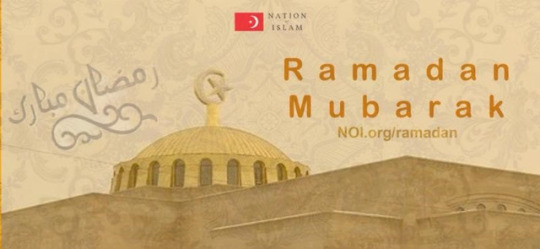
RAMADAN MUBARAK!
As Salaam Alaikum & Ramadan Mubarak!
We trust this reaches you in the very best of health and spirit.
Please find below this Ramadan's Prayer Schedule and Calendar links. Praise be to Allah, fasting began on Monday, May 6, 2019, according to astronomical calculations and majority consensus.
For official updates, local prayer times, ongoing information during the Holy Month of Ramadan and related activities please visit us at noi.org/Ramadan.
May Allah Bless and Reward you with a successful Holy Month of fasting!
Ramadan Mubarak!
We thank Allah for giving us life for the blessing to take part this year in another Beautiful Month of purification, devotion and service!
Allah has Revealed in The Holy Quran: Chapter 2:183-185 "O you who believe, fasting is prescribed for you, as it was prescribed for those before you, so that you may guard against evil... for a certain number of days. But whoever among you is sick or on a journey, (he shall fast) a (like) number of other days And those who find it extremely hard may effect redemption by feeding a poor man."
We will begin the fast before dawn (Fajr Prayer) on the 6th of May until sundown and abstain from food, drink and relations with our husbands or wives during daylight hours for approximately 30 consecutive days. Before dawn we begin our fast with plenty of water or juice - or something light to be sure we are well hydrated throughout the day. This light nourishment before dawn is called Suhoor, which marks our intention to fast each morning. We break our fast at sunset prayer (Maghrib) with water and food of our choice for what is known as Iftar, simply meaning to breakfast.
During this month of fasting, from dawn to sunset, from dawn until dark, the Muslim will not put a drop of water or food in his or her mouth. Nor will that Muslim feed the hunger of sex during the daylight hours. Out of our love for Almighty Allah (God) and obedience to what He has ordered for us in the Holy Qur'an we carry out His discipline.
The Honorable Minister Louis Farrakhan writes,"Fasting strengthens discipline. Thus, fasting is prescribed for us as it was prescribed for those before us that we may guard against evil. What are the results? Self-imposed discipline. When we deprive ourselves of something so essential to life as water and food, for a period of 15 to 18 hours, during the heat of the day, this discipline imposed on ourselves makes it easy for us to discipline other hungers or desires. When we can stop eating and drinking, drives which are natural to life itself, how much more easy is it for us to stop lying, stealing and the practice of those sins that destroy the peace and brotherhood of the society? This fast of Ramadan is one of the greatest means of inculcating self discipline."
This is a month wherein we celebrate the revelation of The Holy Quran through daily readings and extra prayer where many Muslims gather after night prayers for Tarawih prayers, which culminate in the last 10 days of the month in which we observe The Night of Power (Laila-tul-Qadr). It is a month of celebration which ends with a communal feast called 'Id-Al-Fitr - for the Festival of Renewal. We should extend invitations to family, neighbors, and friends to join in fellowship in celebration of this Holy occasion. Children receive gifts and sweets. Charity and feeding the poor is required prior to attending the 'Id feast prayer, in remembrance of the principles of Freedom, Justice and Equality.
1 note
·
View note
Text
TAFSIR: Risale-i Nur: The Letters Collection:The Twenty-Sixth Letter.Part4
The Devil retorted: “That’s what you think! I have deceived most of mankind, and their foremost thinkers, into denying the Qur’an and Muhammad.”
I replied: “Firstly: When seen from a great distance, the largest thing appears the same as the smallest. A star may even look like a candle.
“Secondly: Also, when seen both as secondary and superficially, something which is completely impossible may appear to be possible.
“One time when an old man was watching the sky in order to spot the new moon of Ramadan, a white hair fell on his eye. Imagining it to be the moon, he announced: ‘I have seen the new moon!’ Now, it is impossible that the white hair was the moon, but because his intention was to spot the moon and the hair was by the way and secondary, he paid it no attention and thought the impossibility was possible.
“Thirdly: Also, non-acceptance is one thing and denial is something quite different. Non-acceptance is indifference, a closing of the eyes to something, an ignorant absence of judgement. It may mask many completely impossible things and the mind does not concern itself with them. As for denial, it is not non-acceptance, but the acceptance of non-existence; it is a judgement. The mind is compelled to work. So a devil like you takes hold of someone’s mind and leads it to denial. Showing the false to be truth and the impossible to be possible through such satanic wiles as heedlessness, misguidance, fallacious reasoning, obstinacy, false arguments, pride, deception, and habit, you make those unfortunate creatures in human form swallow unbelief and denial, although they comprise innumerable impossibilities.
“Fourthly: Also, if the Qur’an is supposed to be the word of man, it necessitates imagining to be its opposite a book that has self-evidently guided the purified, veracious saints and spiritual poles, who shine like stars in the heavens of the world of mankind, has continuously instructed all levels of perfected men in truth and justice, veracity and fidelity, faith and trustworthiness, and has ensured the happiness of this world and the next through the truths of the pillars of faith and the principles of the pillars of Islam; a book that through the testimony of its achievements is of necessity veracious, and pure, genuine truth, and absolutely right, and most serious – it necessitates imagining, God forbid, that it comprises the opposites of these qualities, effects, and lights, and not only is a collection of fabrications and lies, but also a frenzy of unbelief that would shame even the Sophists and the devils, and cause them to tremble.
“This impossibility necessitates the further, most ugly and abhorrent, impossibility that the person who, according to the testimony of the religion and Shari‘a of Islam that he proclaimed, and the extraordinary fear of God and pure, sincere worship that he demonstrated throughout his life, and as necessitated by the good moral qualities unanimously witnessed in him, and according to the affirmation of the people of truth and perfection whom he raised, was the most believing, the most steadfast, the most trustworthy, and the most truthful, was – God forbid, and again, God forbid – without faith, that he was most untrustworthy, did not fear God, nor shrink from lying. To imagine this necessitates imagining the most loathsome form of impossibility and perpetrating the most iniquitous and vicious sort of misguidance.
“In Short: As is stated in the Eighteenth Sign of the Nineteenth Letter, the common people, who gain an understanding of the Qur’an’s miraculous nature by listening to it, say: ‘If I were to compare the Qur’an with all the other books I have listened to, or with all the other books in the world, it would resemble none of them; it is not the same as them in either kind or degree.’ The Qur’an, then, is either superior to all of them, or inferior to all of them. It is impossible that it is inferior, and no enemy or the Devil even could say that. In which case, the Qur’an is superior to all other books, and is therefore a miracle. In just the same way, we say according to the categorical proof called “residue,” taken from the sciences of method and logic:
“O Satan and O disciples of Satan! The Qur’an is either the Word of God, come from the supreme throne of God and His Greatest Name, or, God forbid, and again, God forbid, it is a human forgery fabricated on earth by someone without belief who neither feared God nor knew Him. In the face of the above proofs, O Satan, you can neither say that, nor could you have said it, nor will you be able to say it in the future. Therefore, the Qur’an is the Word of the Creator of the universe. Because there is no point between the two; it is impossible and precluded that there should be. And we have proved it most clearly and decisively; and you have seen it and heard it.
“In the same way, Muhammad (Upon whom be blessings and peace) is either God’s Messenger and the highest of the prophets and the most superior of creatures, or, God forbid, he has to be imagined to be someone without belief who fell to the lowest of the low because he lied concerning God, and did not know God, and did not believe in His punishment.2 And as for this, O Devil, neither you, nor the philosophers of Europe or hypocrites of Asia on whom you rely, could say it; neither could you say it in the past, nor shall you be able to say it in the future, for there is no one in the world who would listen to it and accept it. It is because of this that the most corrupting of those philosophers and the most lacking in conscience of the hypocrites, even, admit that ‘Muhammad the Arabian (UWBP) was very clever, and was most moral and upright.’
“Since the matter is limited to these two sides, and the second one is impossible and no one at all claims it to be true, and since we have proved with decisive arguments that there is no point between them, for sure and of necessity, in spite of you and your party, Muhammad the Arabian (Upon whom be blessings and peace) was the Messenger of God, and the highest of the prophets and the best of all creatures.”
Upon him be blessings and peace to the number of angels and jinn and men.
#allah#islam#quran#god#muslim#revert#convert#convert islam#revert islam.#reverthelp#revert help#revert help team#islamhelp#converthelp#prayer#salah#muslimah#reminder#pray#dua#hijab#religion#mohammad#new muslim#new convert#new revert#how to convert islam#convert to islam#welcome to islam
1 note
·
View note
Text
Electric Vehicles in Egypt: Overlooking the obvious.

Photo Credits: Revolta Egypt / Cairo Scene
Recently, there’s been a lot of talk about Electric Vehicles (EV’s) in Egypt. Certainly, it is part of an interesting technological trend of EV’s and (re)exploring it’s role in reducing carbon emissions and local air pollution. For instance, Alexandria Governorate recently inaugurated around 15 new electric buses as part of the Alexandria Transport Authority’s fleet.
According to Revolta, one of the first (and perhaps the sole) EV charging network in Egypt, there are at least, by the start of 2019, 14 charging stations in 4 different governorates. They promise to have a network that would allow “an electric car to charge everywhere in Egypt by 2020”, in addition to building Egypt’s first EV accessories manufacturing and maintenance factory in the City of 6th of October, in Giza. Not to mention that Revolta is also involved in importing and reselling both used and new EVs in Egypt, as more and more people (mainly affluent Cairenes) are directly importing EVs through brokers, benefiting from the recent removal of all tariffs off EVs (except the VAT tax) and a discount on Hybrid vehicles.
youtube
Video: AP video on first electric vehicle charging points in Egypt by Revolta.
It seems though that what has been powering the trend towards EVs in Egypt, is the significant increase in Egypt’s energy production in the years in the aftermath of the crunching energy crisis in 2013/2014, reaching a surplus of as much as 25% in March 2019.
A member of the Transport committee in the Egyptian Parliament, MP Yousif ElShazly, already brought up – and effectively made the connection between – the increase in Egypt’s energy reserve and the need to build more infrastructure to absorb the future proliferation of private EVs. Also, the Energy and Environment committee similarly held sessions to review the challenges facing the operation of Electric cars and the need to spread EV charging points throughout Egypt.
Putting these positive policy and field developments aside, other forms of electric mobility were not as lucky: At a time cities are rebuilding their former tram and light rail networks, Cairo Governorate removed the remaining stretch of rails off the streets of Heliopolis. The removal of the remaining tram lines and green street medias, opened up the way for mega highway and flyover projects dissecting the heart of formerly leafy and green street medians.
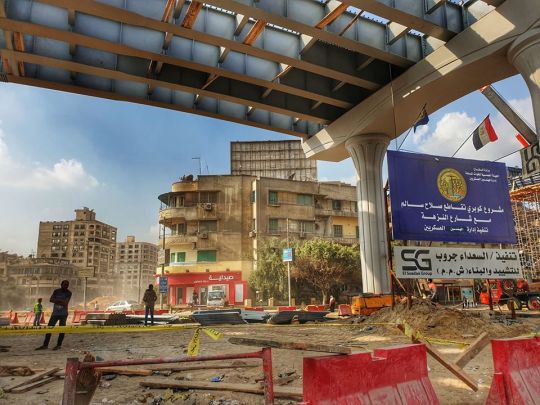
Construction of a new flyover on former tram tracks in Nozha street, Heliopolis Photo Credit: Michael Hanna - November 2018
While this might provide some relief for traffic on the short run, induced demand will result in future catastrophic results as traffic volumes on these new corridors surge and consume all the available capacity, and block all nearby subsidiary roads.
With the current administration, all roads seem to lead to the so called “New Administrative Capital” (NAC), which is built entirely around the private vehicle, epitomizing the upper middle class fantasies (and in of itself being the produce of ‘elite’ Egyptian engineers).
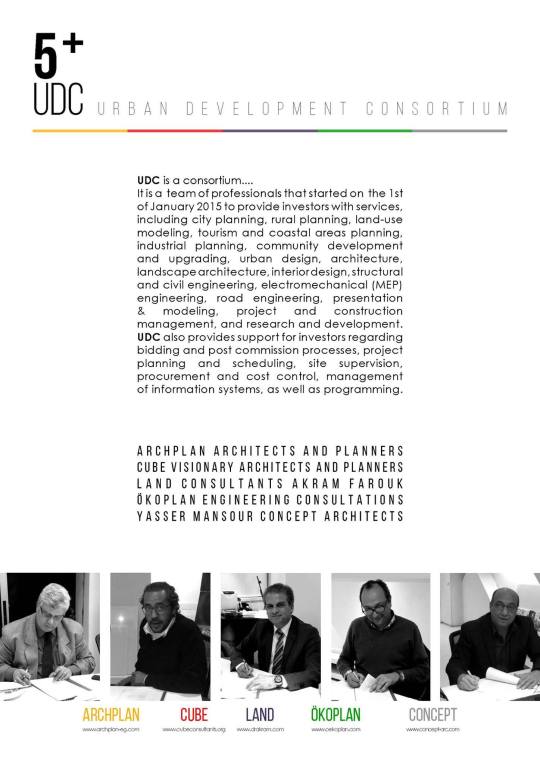
Poster produced by the Urban Development Consortium (UDC+5) that placed the designs for NAC and currently oversee its construction. Photo Credit: UDC+5 Facebook page
It’s not to say that the government doesn’t build any mass transit infrastructure, quite the contrary: there are several ongoing projects and plans to extend the monorail lines from the NAC and 6th of October city, to Cairo and Giza respectively.
The new Adly Mansour intermodal / Interchange station currently under-construction is earmarked as a future Cairo “Ostbahnhof” or a ‘Cairo East’ railway station, creating an interchange point with Cairo metro (Line 3), El-Salam microbuses/Shared Taxis and other public buses, and planned monorail and electric train connections towards new communities such as ElSalam city, New Cairo, the NAC, Sherouk and 10th of Ramadan city, connecting them with existing towns nearby such as Bilbais, and Ain ElSukhna.
Yet, the common denominator in all of these projects is how they divert all traffic from Cairo center, and seem to bypass the city altogether. These actions, while they seem arbitrary and random to some, is actually the continuation of a half a century old national plan by the Egyptian government to build a new capital, “de-concentrate” the population out of the Nile river valley, and to invade the expansive ‘empty’ deserts. This plan has over the past decades translated to state wide policies that lead to meager funding to existing localities in favor of new communities.
These policies, in their current form and focus on car friendly cities, will affect Egypt’s ability to adopt carbon neutral transport and to be able to deploy sustainable forms of public transit in the future. Also, they tend to overlook the underlying socioeconomic factors that hinder lower middle class and low income families from moving into such new communities or to benefit from the extensive road network that connects new cities. According to Ahmed El-Dorghamy and David Sims (based on data from 2014)*, only 11% of families in Egypt have private vehicles.

Screenshot: A public post by Eng. Sherif Yassin from the ENR, discussing whether it is wise to invest in heavy diesel locomotives with short-life spans, versus electric traction which according to Eng. Yassin is the same price per unit and much better and durable. Photo credit: Facebook group عالم النقل والسكك الحديدية
The mass majority of Egyptian families rely on walking, Shared Taxis/microbuses, Public Transit buses and Metro/regional and inter-city trains when available. Hence, these families will continue to prefer living in denser areas, even if the housing conditions are precarious. Any new city that is not dense enough or at least walking and transit friendly will not achieve it’s original population targets.
Keeping these factors in mind, it is imperative to note that the current approach in Egypt towards EVs, and specifically electric buses and cars, are more or less bound to follow the same patterns the current mobility split; which is heavily reliant on private cars, minivans and Mircobuses/taxis. Existing or previously existing solutions, such as tram and LRT upgrades in Cairo and Alexandria, and electrification of the Egyptian National Railway (ENR) services continue to take a lower priority (and is in desperate need for more investments). In fact, the remaining tram lines in Heliopolis, Cairo – once a landmark of this neighborhood – were recently removed and replaced by wider lanes and more flyovers.
youtube
Video: Recently produced GE Diesel locomotives for the ENR. There has been recent debate within the ranks of the ENR on whether it should invest more in diesel or make the move to Electric traction already.
It is important to note, that electric cars are still much better than the current situation in Cairo, for example, a city that has one of the highest particulate matter air pollution in the world. Not to mention that contrary to popular belief, electric cars are much more efficient in power consumption per mile than combustion powered cars. So even if the energy that supplies these cars comes from a fossil fuel powered plant, electric cars consume less energy per mile than a petrol car would.
youtube
Video by AP: End of the line for Cairo's iconic trams
Having that said, I believe there are two main issues when it comes to the proliferation of privately owned EVs in Egypt:
1) Private cars are less efficient at moving people and occupy way to much space on the road at all stages of it’s lifetime. No matter how wide the motorways and arterial roads are, there won’t be enough capacity to handle the volume of commuters if we are to depend mainly on private vehicles.
2) Actively promoting the use of private EVs by building car friendly new urban communities shifts the costs and urban mobility operations to the individual car owners, putting an extra burden on those who are barely able to afford keeping and maintaining a private car, and completely excluding those who cannot drive or are unable to afford buying a car in the first place.
3) Heavily relying on private cars for urban mobility puts a tremendous burden on traffic regulation authorities and traffic police units, who are not originally responsible for the planning of the cities but usually find themselves stuck between a rock and a very hard place as they try to keep the roads flowing, while they also having to control other aspects of traffic safety and law enforcement.

Cairo Tram Network since 1896 - with overlay of the Metro lines. Inter-connectivity between buses, trams and Metro could have been the bread and butter of Cairo's Urban mobility plan (Map by: Dörrbecker n.d.)
Verdict on Electric Cars in Egypt: Yeah nah?
While the role of Cairo’s old trams, it’s buses and even metro is overlooked by the current ongoing new projects and plans in Egypt; it is also extremely difficult to close the door entirely on EVs.
Ideally, an integrated, inclusive and expansive network of public transit is much more desirable than simply switching the gas guzzling private cars to EVs. Privately owned cars just simply take up too much space, and in Egypt are mostly out of reach of the vast majority of the population.
However, all things considered, electric vehicles do represent an opportunity as were the Electric trams and LRT in the late 19th Century in Egypt. While it may not immediately resolve the issues related to accessibility to public transit, it might be a start to talk about and tackle the worsening air pollution conditions in Cairo.
If EVs are integrated as part of a National Sustainable Mobility plan, the outcomes of switching from fossil fueled cars to EVs will bring great benefit to Egyptian streets. Those benefits, which come first and foremost in terms of reducing particulate matter pollution and decreasing energy consumption per miles traveled; can also have further benefits in the future as new renewable energy projects commence and the share of renewables in the energy mix increase. Not only would that wean Egypt off it’s heavy reliance on oil markets, but it would also set a good example of a developing country in terms of fulfilling some of it’s Nationally Determined Commitments (NDCs) under the Paris Climate Agreement and contribute to the 2030 UN Sustainability Development Goals (SDGs)
0 notes
Text
The Unwanted Effects Of Date Fruit For over 60 decades, Sphinx Date Co. has provided
youtube
For over 60 decades, Sphinx Date Co. has provided premium high quality bulk dates and date gifts. Date fruit may be eaten raw or dried. Throughout the subsequent part of February we start off to see for your sheaths about the man trees to begin with dividing open up. In Islamic civilization, dates and yogurt or milk are typically the initial foods consumed by Iftar immediately after the sun has put during Ramadan.
The diet divides fruits in to different types: acidic fruits like pineapples, oranges, and berries; semi-acidic fruits such as apples, pears, and berries; along with sweet fruits such as bananas, figs, and dates. Dry fruits will probably be yummy plus it's overly excellent for health.
Though the fiber in dates has the power to lower cholesterol levels, researchers in the Technion-Israel Institute of technologies in Israel report which dates possess improved consequences at lowering cholesterol levels, which is another kind of fat in the bloodvessels.
Date sugar : Made from dried dates that have been finely ground, date sugar looks like brown sugar, but it doesn't soften like sugar. Apple trees are easy to grow, and if an gardener buys a massive tree, he can undergo fruit improvement even on the first year of growing and planting.
Mature date palms can produce 68 into 176 kilograms of dates a crop season, although they usually do not all ripen at an identical time therefore lots of harvests are required. Moderate ingestion of fruits may control your blood sugar level. kedai kurma Spicy Foods - There's just a great urban legend that says hot foods could also will cause your job.
Many surveys done in the united states revealed effective weight reduction following fruits have been comprised in your household 's dietary plan. Red dates, peanuts, dried longan, together with brown sugar, add water little by little to your pot, stew slowly till they are rotten. Although dates may be eaten fresh, the fruit can be very often dried, resembling carbohydrates or plums.
Date palm fruits have large nutritional and curative value with critical antioxidant, antibacterial, anti-fungal, and anti-proliferative houses. Dates are a High fiber fruit that's commonly sold chopped or whole. You are able to readily put them to your cereal grain, such like oatmeal or quinoa, toss chopped dates to some salad or stuff dates together with such food pairs: goat breads and cheese; feta cheese and peppers; diced melon and new mint; or diced apples and pecans.
Date palm trees are all cultivated all over the world specially round tropical areas. That really is another fruit which I hadn't ever seen out Houston in buah kurma the U.S. Although ironic dates are frequently available in the U.S., fresh dates are generally offered at some Middle Eastern retailers in nations where significant Arabic population exist, such as Michigan.
Foods from that you might possibly not suspect the preservative are bottled lemon and lime juice, dried fruits and vegetables, canned and frozen fruits and vegetables, dried herbs, spices and green, among numerous other folks. In one study, 2-1 those that consumed 7 dates every day for 21 days experienced advancements in stool frequency and needed a substantial growth in bowel movements in contrast to when they did not consume dates ( 4 ).

Through Greece, India, Italy, Asia as well as different regions all across the globe the holy symbols are repeated in hidden artistic art which communicates the soul code keys of these people along with also their understanding of the symbols at the time they were created. Dates will be the fruit of the date palm tree and are increased primarily in arid, dry areas, like the Middle East and parts of California.
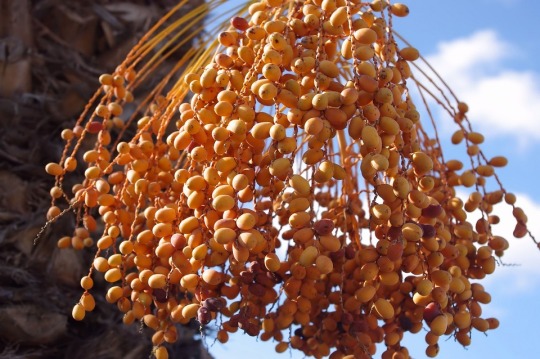
It is believed that taking this particular vinegar together with food enhance the sensation of being complete and prevents over eating. This took a lot changes and efforts from foods and life style until he master and implemented a complete pH stability Diet that caused it to be possible. Dates are reported to have the second best antioxidant worth of fruits usually consumed in China, even though some variant is different between scientific studies as a result of distinct methods for measuring antioxidant content.
Trade water for fruit juice or liquor, such as brandy, bourbon, or rum. Dates contain natural and organic sulphur, which is rarely seen in different foods. Now, huge numbers of folks across the globe are appreciating the healthful benefits that can come from drinking all-natural Noni juice.
Alternately, a number of these nutrition information before given to athletes to carbohydrate load which includes the consumption of toast and jam, jellybeans along with carbonated soft drinks seems obsolete, demonstrably we understand these foods really are full carbohydrate but they are lacking other essential nutritional elements needed for elite effectiveness and may even lead to the accumulation of excess body fat, and which in itself may hamper operation.
Blossom SB many thanks for studying and your comment.Dates are acutely yummy and Palm bushes have a tendency to alter from elevation. Nutritionists have found that the fruit of the jujube tree comprises beneficial concentrations of natural vitamins A, b 2, and do. The jujube additionally contains minerals required for well being, for example as magnesium, calcium, calcium and iron.
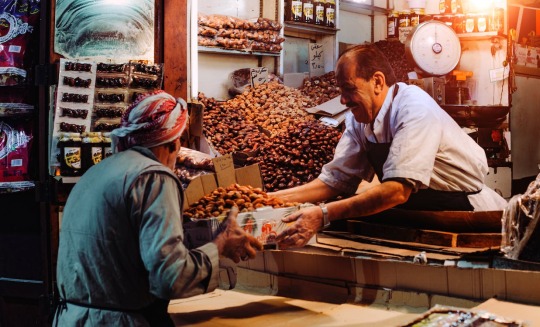
0 notes
Link
Approximately 1% of Americans are Muslims. Islam is a monotheistic religion, and those that identify as Muslim believe in Allah, which literally means “the God”, and follow the religious text called the Quran. Muslim Americans make up a small percentage of the United States population, but Islam is major world religion.
This article interviews Nazita Lajevardi’s and discusses her experiences as a Muslim woman in America. It also talks about her book called Outsiders At Home: The Politics of Islamophobia and highlights the effects that the attacks of 9/11 had on the discrimination against Muslims. Lajevardi also explains how Islamophobia is not just personal to her, but that it effects the Muslim American community as whole. She points out that this discrimination she has had to go through is rooted in the American system and in politics. When asked about the title of her book “Outsiders At Home”, she said, “no matter how much we check the boxes of being American — being born here, reciting the Pledge of Allegiance every morning of grade school, serving our country, being active in politics and in our communities, whatever the metric is — we will never be welcome.” This sense of not belonging is felt throughout the Muslim community of America, as Lajevardi points out by touching on experiences her friends and family have been through, and by including not only personal stories in her book, but also other people’s accounts of discrimination. In class we watched a PBS documentary called America at a Crossroads: The Muslim Americans that also showed the discrimination Muslim Americans face in society. Both Nazita Lajevardi and the documentary film highlight how the terrorist attacks of September 11, 2001 played a major role in changing how people view Muslims. Since these attacks the media in America has created a wrongfully negative outlook towards people of this religion. One part of the documentary shows the discrimination against a Muslim mother and son, when their property was vandalized with trash thrown in their yard, words dug through their lawn and their tires slashed. This unfair treatment is unfortunately familiar to many Muslims Americans, and has caused them to face many struggles in society. Both the documentary and article discuss how Muslim Americans are constantly living in fear. The film shows many different examples of this, and especially highlights this topic by showing the vandalized property and the people’s reaction to it. The mother and son were scared that they would be attacked again and did not feel safe. In the article, Lajevardi is asked about how Islamophobia can affect people mentally. She talks about how many of her family members and people in her community avoided going to Mosques and other events due to the fear of being discriminated against and attacked. She says “My grandfather in particular kept insisting that we should not go to the mosque during Ramadan because he was so scared there may be an attack.” These examples show how the discrimination and unfair treatment of Muslims Americans have an affect on their day to day life, and well being as a whole. They face injustice and prejudice due to the negative portrayal the media produces about them, based on an event that they are not responsible for.
Although I cannot personally relate to the feelings Muslims Americans have to experience, it makes me sad to know that a whole group of people is wrongfully associated with such a terrible event in our history. I would love to read Nazita Lajevardi’s book because it seems like it would be helpful in understanding the “systematic and political” roots of Islamophobia and overall very eye opening to a topic that should be brought to more people’s attention.
0 notes
Text
Arab coalition announces two-week ceasefire in Yemen
Carrom’s coronavirus comeback? Saudis are turning to a conventional Indian board recreation to flee boredom
JEDDAH: When the worldwide coronavirus pandemic hit, some nations ignored it, whereas others had folks singing from their balconies to beat the lockdown blues.
In Saudi Arabia, folks trooped to toy shops to purchase a largely forgotten conventional board recreation, carrom, which rapidly offered out throughout the Kingdom.
Carrom is a wood table-top board recreation that bears many similarities to pool. Completely different requirements and guidelines exist in totally different components of the world.
The board, sq. in form, is commonly positioned on 4 wood legs, with every participant occupying one facet of the sq..
Demand for carrom boards rocketed as lockdowns and curfews aimed toward halting the unfold of the coronavirus compelled Saudis to search for methods to maintain boredom at bay.
For a lot of households, there isn’t a higher approach to keep entertained than by enjoying carrom, a board recreation that each young and old get pleasure from.
Carrom is common in many components of the Gulf area, particularly in the coastal areas of Saudi Arabia, the place its enchantment cuts throughout all age teams.
Majid Al-Dosari, an engineer working from residence in Jeddah, considers himself fortunate to have purchased a carrom board simply days earlier than the merchandise offered out.
“I got into it a few weeks ago after playing games with my future in-laws, and I wanted to get one for my family,” he informed Arab Information.
“We usually meet up for lunch, but now we play carrom together throughout the day. It’s coffee and tea and carrom with my brother, his wife and my sister.”
When Jeddah was positioned below curfew, Al-Dosari positioned his order via the Haraj web site. The vendor delivered the merchandise to his home two days later for SR90 ($24).
“Prices of carrom boards tripled afterwards, going up to SR300-400. They sold out very quickly,” Al-Dosari mentioned.
In lots of shops in Jeddah, together with outlets in the town’s downtown space, the board recreation is now out of inventory.
THE RULES OF THE GAME
A carrom recreation is a contest between two particular person gamers or two groups of two gamers every. Rival groups are assigned white or black cash earlier than the sport begins, and every workforce tries to win by sinking all 9 cash of their coloration in the pockets and securing the red-colored queen. The queen can solely be pursued after at the least one carrom man of the participant’s coloration has been secured. It can’t be secured if its pocketing will not be adopted up by the sinking of a carrom man of the participant’s coloration.
If both situation will not be met, the queen needs to be positioned again in the center of the board. Every black and white piece counts as one level, whereas the queen counts as 5 (three universally) factors. The scoring system varies from area to area, however in most components of Saudi Arabia, the workforce that collects 21 factors (25 universally) wins the sport.
Clients now are looking the web sites of on-line retailers that declare to import the most effective carrom boards from India for supply in Saudi Arabia.
Carrom is mostly performed throughout Ramadan nights as folks keep up with members of the family or pals, ready for the early morning name to prayer.
Originally of a recreation, small round wood disks, referred to as carrom males or cash, are massed in a bunch in a circle on the heart of the board.
The association is taken into account full when 9 black cash and 9 white items are positioned in Y formation, surrounded by black cash and the purple “queen” in the middle. A puck, often known as “striker,” is then used to flick carrom males and the queen into pockets positioned on the board’s 4 edges.
Carrom lore means that the sport first reached Saudi Arabia by way of the Hijaz area via merchants from India.
Over the many years, it grew to become an essential a part of social life in the Kingdom, that includes in household occasions, all-female or all-male conferences, and even in gatherings of youngsters.
Artist Najat Mutahr’s tribute to Hijaz’s connection to the board recreation: Saudi grandparents enjoying carrom with grandchild. (Art work by @nmutahr)
Saudi artist Najat Mutahr has highlighted Hijaz’s hyperlinks with carrom via an art work displaying grandparents enjoying the board recreation with their grandchild.
Saad Al-Suwaiyan, a Saudi anthropologist, has described carrom as one of many video games performed by Saudis for generations and whose enchantment has no age limits.
Tribute has been paid in the 12th quantity of Al-Suwaiyan’s collection “Traditional Culture of Saudi Arabia,” which is devoted to common video games and their significance in Arab and Saudi social life.
References to carrom are additionally to be discovered in Saudi literature. In her guide “Carrom,” revealed in 2019 by Dar Molhimon, writer Rehab Abu Zeid says the principles of the sport assist sort out points similar to patriarchy and paternalism, with the primary stroke of a recreation unleashing chaos in the lives of the novel’s characters.
THE ORIGINS OF CARROM
Carrom is understood in totally different areas of the world in alternative ways: kayrum (Arabic), caroom, karom, couronne, carum, karam and finger billiards.
The fashionable model is believed to have originated in India. One carrom board with its floor product of glass is obtainable in one of many palaces in the previous princely state of Patiala.
It grew to become highly regarded amongst extraordinary Indians after World Battle I, when totally different provinces started to carry competitions.
The world’s longest carrom marathon lasted 34 hours, 45 minutes, 56 seconds in India. The fifth spherical of Carrom World Cup was held in South Korea in 2018.
In Saudi Arabia, there are a number of variations of the carrom recreation. The commonest, Cash or Fuloos, pits two particular person gamers towards one another.
Gamers can acquire factors ranging from 5 for a black piece, 10 for a white one and 50 factors for the queen.
The participant who collects probably the most factors wins. The preparations of the cash can range, however the queen stays central.
Data of the principles of the sport are as soon as once more in demand in Saudi households.
“I grew up playing carrom with my mom and her family,” Nahid Noor, a 39-year-old instructor from Jeddah, informed Arab Information.
“The competition tended to be fierce. A tournament would often materialize in the course of a gathering.”
Carrom is a highly regarded recreation amongst South Asian youngsters. (Provided)
Noor, a mom of two, mentioned that that over time, her household had misplaced the behavior of carrom enjoying.
The sport was performed solely hardly ever — till the coronavirus lockdowns started.
She describes her household’s carrom board as battered and previous, however invaluable.
“I just can’t seem to find another one of such high quality. I think my mother bought it from a toy shop in Jeddah seven years ago,” she mentioned.
Based on Noor, the board recreation has made household gatherings extra gratifying throughout a tense and troublesome time.
Late nights are marked by household banter, laughter and, at occasions, shrieks of disappointment from gamers after they miss a toss.
“We are all stuck at home now, with nothing to pass the time after everyone is done with their work and chores,” she informed Arab Information.
“So, we are pulling out the old carrom board and starting to play the game again.”
from WordPress https://ift.tt/2XnCh1V
via IFTTT
0 notes
Text
*Why do you fast in Ramadan?* A simple explanation to give to non-Muslims or the youth!
*Why do you fast in Ramadan?* A simple explanation to give to non-Muslims or the youth! يَٰٓأَيُّهَا ٱلَّذِينَ ءَامَنُوا۟ كُتِبَ عَلَيْكُمُ ٱلصِّيَامُ كَمَا كُتِبَ عَلَى ٱلَّذِينَ مِن قَبْلِكُمْ لَعَلَّكُمْ تَتَّقُونَ O you who believe! Fasting is prescribed for you as it was prescribed for those before you, that you may have Taqwa (become righteous/God conscious). Al-Baqarah 2:183 We begin in the name of Allah, the Most Gracious and the Most Merciful! Many people ask Muslims why do you fast in Ramadan? And usually its followed by 'isn't it hard?' and 'why does God ask you to do this to yourself?' Like many Muslims it's not so simple to explain this most observed pillar of Islam of 1.8 billion Muslims around the World in just a single statement. However the Quran summarises it beautifully. Now just quoting the Quran devoid of context many can not appreciate its intended deeper meaning. So my key message to you here is to briefly explain this commonly quoted verse regarding fasting in the Qur'an and also explain the many benefits of doing so! What does God say in the Quran, He says 'Fasting is prescribed for you as it was prescribed for those before you... this is the first part of the verse mentioned earlier. And when we think of something being prescribed we think of ...medicine! Something very much needed, and with the positive effects it has you cannot refuse but to take it! You will find many Muslims for whatever reason who are told that they cannot fast, get very upset! As fasting is like a medicine that we crave and we need deep within our souls. And best of all, it is prescribed by the Creator of everything and we are promised to be rewarded specially for this observance. You may have noticed and I still find it quite amazing that many Muslims get into fasting with such vigour! And knowing which day to begin the fast, matters! Some research polls say that up to 93% of Muslims fast every year. Thus making it the most observed act of worship after believing in God and the prophet Muhammad (Peace be upon him). Especially from those who may not be as outwardly practicing throughout the year. You will find that this time of the year the mosques and prayer rooms fill up, the Qurans and headscarves become more visible. You even find professional athletes like footballers to youngsters in primary schools showing a real determination to fast in Ramadan! And they do it with such eagerness despite the hardship - showing true grit and you cant dissuade them even if you tried! Ask coaches, teachers and parents and they will tell you. Let me also just add, that fasting is not required on those who would be harmed by long fasts. As God says He does not burden a soul more than what it can bear, i.e. those who are old, pregnant, travelling and so on. But the clear eagerness to fast by many is the deep satisfication you feel at the end of the fast! How else can I best describe it but a feeling of pure joy when you tuck into delicious foods and its humbling as you have consciously sacrificed your priceless needs of food and water for around 18 hours. By doing so for a higher cause you appreciate all the favours you have in your life, such as good health, plentiful food, family, community. So through fasting we develop gratitude and we cannot say anything else but send praise to God! Alhamdulillah! So fasting is just like medicine, its prescribed for the soul and it has physical benefits too. What are these physical benefits? 1. Becoming a better person and more God conscious (Gaining taqwa). Fundamentally Ramadan offers the opportunity to reconnect with God through a number of physical acts of worship and the focus is not just fasting. Muslims are recommended to pray late into the night remembering God. Thereafter Muslims are not only commanded to abstain from food, but also be more conscious of themselves by avoiding bad conduct, lying, cheating and so on. So you will find many who will avoid situations that may lead to conflicts and therefore many are well behaved and self conscious of their conduct. Which is great for families, workplaces and the community. When fasting you have to be on your best behaviour! And it disciplines you! you will find that when you do not have food in your bellies you become a more caring conscious person, check out these Youtube social experiments on the generosity of homeless people. And so God says in the later part of the verse I mentioned earlier "...so that you become righteous (or God conscious)" It's amazing! 2. You will find a favourite past-time of Muslims in this month, is giving. We reflect upon the Quran daily which softens our hearts to the struggles of this life as illustrated by the stories of the prophets and Gods eternal wisdom. When you hear your grumbling stomach and experience your dry throat, you learn to empathise with the poorest. You reflect on your own choice to fast when others don't have a choice. When you fast you open your eyes to see those who really have it tough. In addition one of the massive benefits of Muslims fasting is that millions of pounds are donated to charity within this month for local and international causes. Also in Islam, not only is money seen as charity but also saying kind words, smiling, the acts of helping people or animals are highly encouraged as a form of charity. And so Muslims give wholeheartedly of their money to a variety of causes and they spend on food and gifts for their guests; inviting whom they know and also those whom are complete strangers.To give their guests the very best of food and in large quantities is actually an Abrahamic tradition! But something more valuable they give to one another is their precious time and sincerity. By sitting with people especially on the floor, sharing food we lose our egos and sense of pride and we are able to build positive relationships. Its a great time for Muslims to rebuild those neglected relationships be it with families, friends or the community. It becomes much more easier to do so because we all eating at the same time! 3. Fasting in Ramadan offers the opportunity to purify! To purify the body, which goes through a full detoxification cycle. Health professionals will tell you the amazing benefits! Intermittent fasting has become very popular, such as the 5/2 diet advocated by Dr Mosley, whose book I'm currently reading. For many Muslims we love it when science supports our practices, and did you know we have been recommend the 5/2 diet since the 7th century! The Prophet Muhammad PBUH routinely fasted Mondays and Thursdays throughout his life! You also go through a mental spiritual purification - it makes you stop and think, you hit the pause button, and reflect on whats going on in your life; where are you heading? why are you here? what is happening around you? how do you find your place in the world? In summary what is the purpose of your being? Fasting makes you see the reality of this world and life, kind of like when Neo from the Matrix takes the red pill, you are able to see life from a different perspective. I personally find it a great time to get to know yourself better as you strive physically, emotionally and spiritually. And because it is a common shared experience: as we are all doing it together, it is the best time to accomplish many goals together! And it is my hope that in this month being the best time, we can work together for the community. As Muslims we are obliged to show gratitude and be hospitable, so thank God for all the good we have in our lives and we thank all those who help us in our daily lives from the depth of our hearts. In this month when our hearts are soft. Muslim make sure to initiate good actions as in Islam we have a saying 'the person who initiates a good gets all the rewards of what comes after it'. So please share this with your colleagues who are interested in wanting know about Ramadan and why Muslims fast! سُبْحَانَكَ اللّٰهُمَّ وَبِحَمْدِكَ، أَشْهَدُ أَنْ لاَ إِلَهَ إِلاَّ أَنْتَ، أَسْتَغْفِرُكَ وَأَتُوْبُ إِلَيْكَ Glory is to You, O Allah, and praise is to You. I bear witness that there is none worthy of worship but You. I seek Your forgiveness and repent to You. And from the heart, As salaamu alaykum - Peace be upon you all! Written speech delivered for non Muslim guests by your brother [email protected]
0 notes